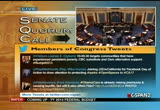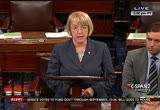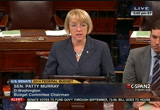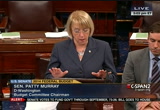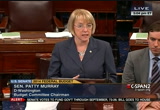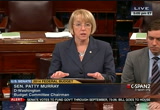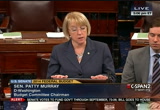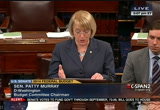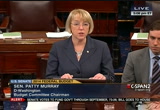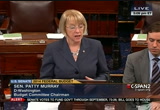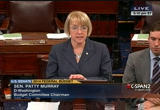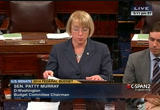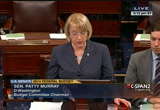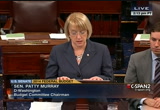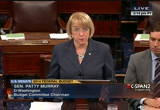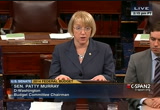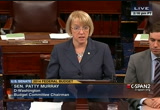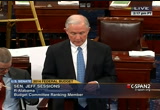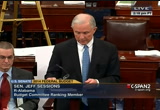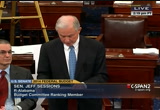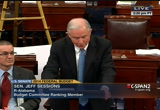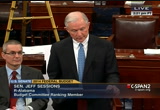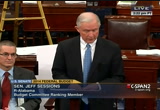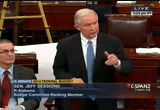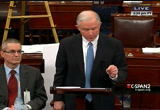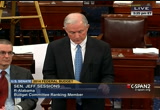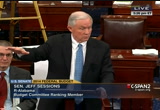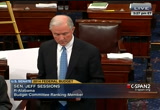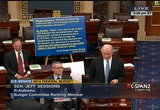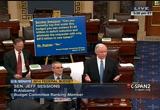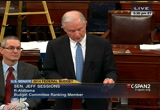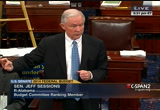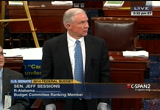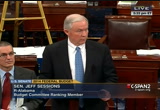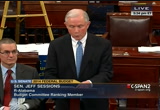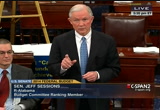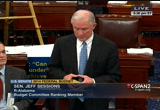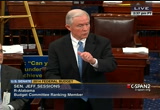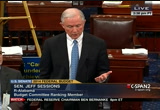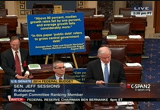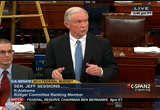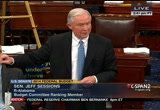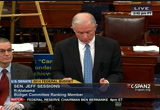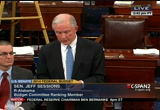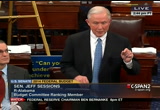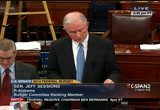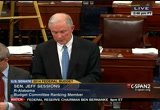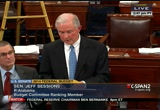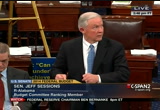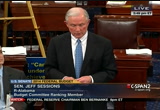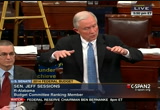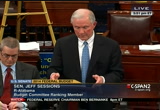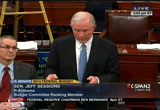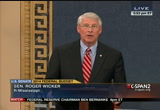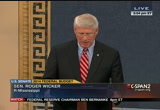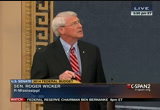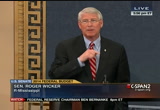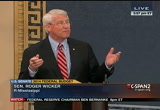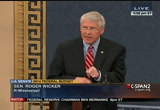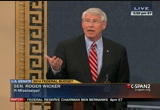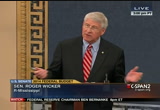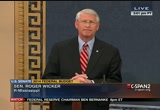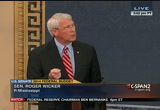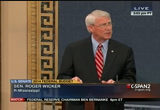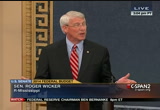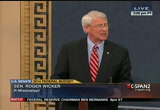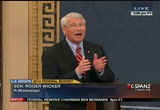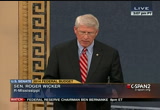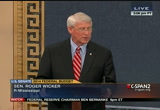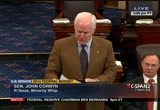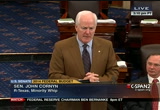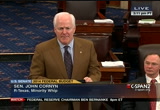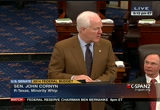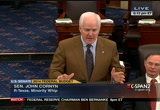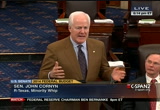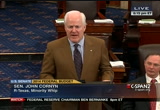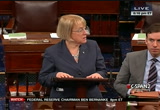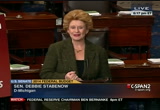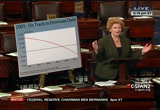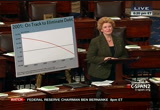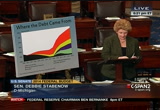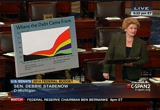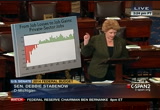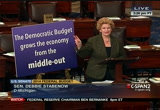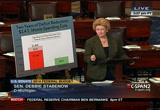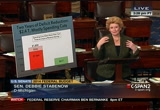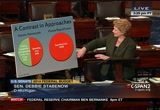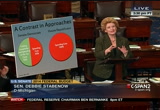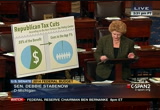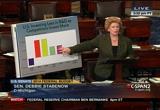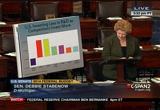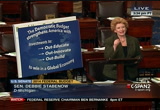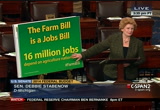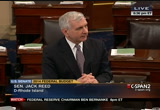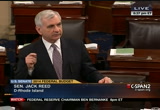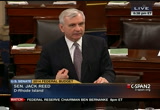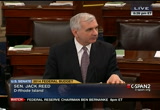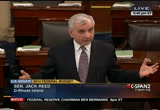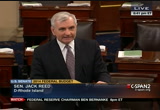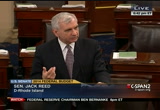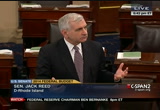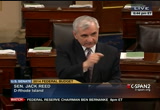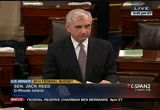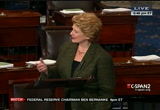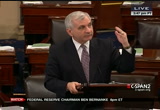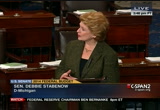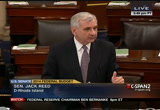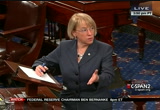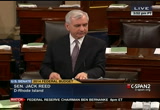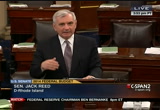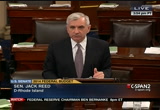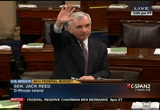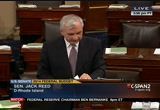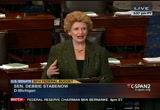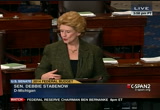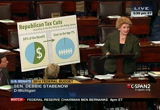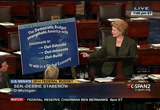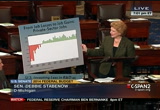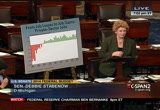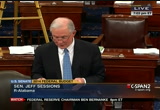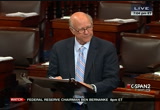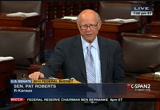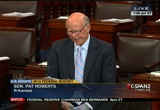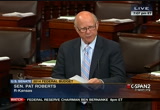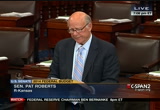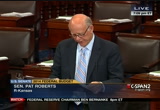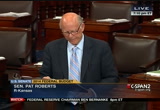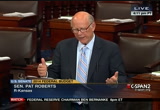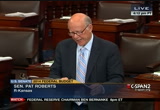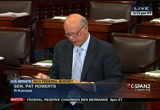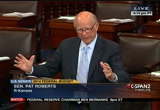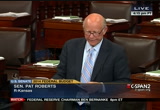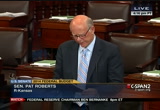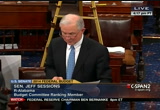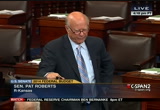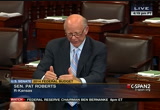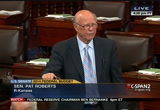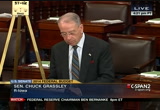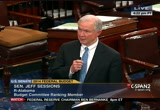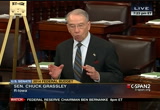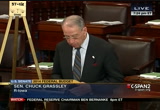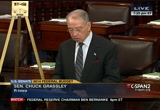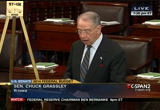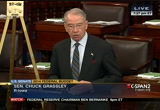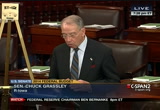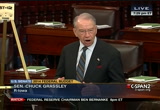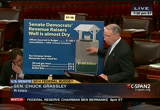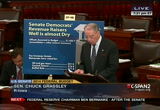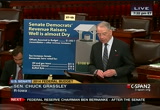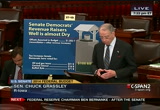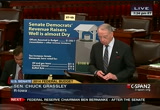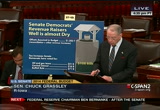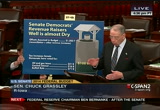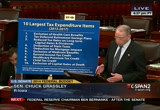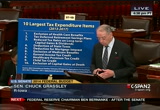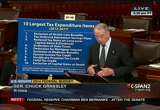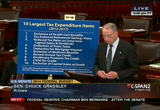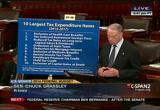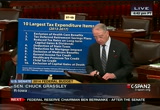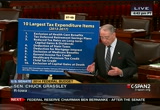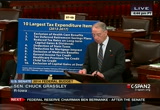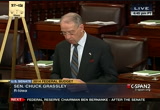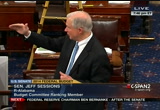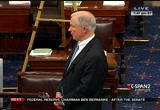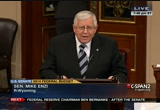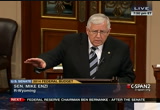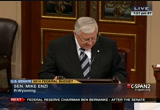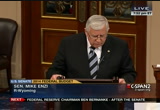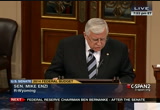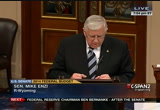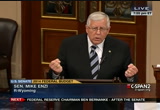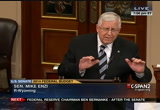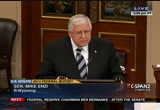tv U.S. Senate CSPAN March 20, 2013 5:00pm-8:00pm EDT
5:00 pm
quorum call: mrs. murray: mr. president? the presiding officer: the senior senator from washington state is recognized. mrs. murray: mr. president, i ask unanimous consent the quorum call be dispensed with. the presiding officer: without objection, so ordered. mrs. murray: i ask unanimous consent the senate now proceed to the consideration of calendar number 28, s. con. res. 28. the presiding officer: without objection, so ordered. the clerk will report. the clerk: calendar number 28, senate concurrent resolution 8, setting forth the congressional budget for the united states government for fiscal year 2014,
5:01 pm
revising the appropriate budgetary levels -- mrs. murray: i ask unanimous consent the reading be dispensed with. the presiding officer: without objection, so ordered. mrs. murray: i ask any time in quorum call be equally divided. i ask no amendments be in order for the remainder of today's consideration of s. con. res. 8. the presiding officer: without objection, so ordered. mrs. murray: i ask unanimous consent the use of calculators be permitted on the floor during consideration of the budget resolution. the presiding officer: without objection, so ordered. mrs. murray: i ask unanimous consent that emily sharp and michael brenson, detailees to the budget committee, be granted floor privileges for consideration of the budget resolution. the presiding officer: without objection, so ordered. mrs. murray: i ask staff be permitted to make technical changes to the resolution as necessary consistent with adoptions of the senate amendment including calculating the associated change under section 104 and incorporating the effect of such adopted amendments under the budgetary
5:02 pm
aggregates of section 101 for federal revenues, the amount by which federal revenues should be changed, deficits, public debt and debt held by the public. the presiding officer: without objection, so ordered. mrs. murray: i ask unanimous consent the following members of my budget committee staff be granted full floor access for the duration of the consideration of s. con. res. -- john rider and rick jones. the presiding officer: without objection, so ordered. mrs. murray: finally, mr. president, i ask unanimous consent the period of debate for economic goals and policy under section 305-b of the congressional budget act occur on march 21 at a time to be determined by the two managers. the presiding officer: without objection, so ordered. mrs. murray: thank you, mr. president. we are now on the floor of the senate with the budget. i want to thank my counterpart, mr. sessions, for all his work and his staff's work and my staff's to get us to the point here that we are debating this bill and this amendment. senator sessions has been very gracious in working with us. we have gotten to this. we obviously have differences of opinion, but i want to commend
5:03 pm
him for the tremendous amount of work he has put into this. it's going to be great to be working with him on the floor. mr. president, when i go back home to washington state, my constituents tell me that they are sick and tired of the gridlock and dysfunction here in washington, d.c. they can see that our economy is slowly getting back on its feet, businesses are beginning to hire more workers, but my constituents and people across the country are very frustrated that the constant political crises are holding our recovery back right when we need to be doing everything possible to support it. after two years of debate about fiscal and economic policy and an election in which voters spoke loudly and clearly, the american people want their elected representatives to stop arguing and reach some solutions. mr. president, i come to the floor today to discuss a budget plan that meets this challenge. the senate budget that passed through the budget committee
5:04 pm
last week with the strong support of all ten democrats and two independents. it is a responsible and balanced plan that puts the economy first and tackles our deficit and debt responsibly and credibly, and i am hopeful that after it passes the senate, the house of representatives stands ready to compromise as well and we can come together around a balanced and bipartisan deal that the american people expect and deserve. mr. president, the budget debate is too often discussed in terms of abstract numbers and political winners and losers, but the truth is that budgets are about far more than that. they are about our values and our priorities. they are about our visions for how government should be serving its citizens today and for generations to come. and most of all, they are about the people across the country whose lives are impacted by the decisions that we make. mr. president, the budget we will be debating on the floor
5:05 pm
this week puts those people first. it reflects the pro-growth, pro-middle-class agenda that the american people went to the polls in support of last election, and i believe that it is a strong and responsible vision for building a foundation for growth and restoring the promise of american opportunity. our budget is built on three principles -- number one, we need to protect our fragile economic recovery. we need to create jobs and invest in long-term growth. number two, we need to tackle our deficit and our debt fairly and responsibly. and number three, we need to keep the promises that we have made as a nation to our seniors and our families and our communities. the highest priority of our budget is to create the conditions for job creation, economic growth and prosperity built from the middle out, not the top down. we believe that with the
5:06 pm
unemployment rate that remains stubbornly high and a middle class that has seen their wages stagnate for far too long, we simply cannot afford any threats to our fragile recovery. so this budget fully replaces the cuts from sequestration that threaten 750,000 jobs this year alone and economic growth for years to come as well as our national security and the programs families and communities depend on. it replaces those automatic cuts in a fair and responsible way following the precedent that was set in the year-end deal. half of the new deficit reduction to replace sequestration comes from responsible spending cuts across the federal budget and half comes from new savings found through closing loopholes and cutting wasteful spending in the tax code that benefits the wealthiest americans and biggest corporations. in addition to replacing sequestration with deficit
5:07 pm
reduction that is far more responsible, our budget follows the advice of experts and economists across the political spectrum who say it makes sense to invest in job creation in the short term while putting ourselves on a strong path to responsible and sustainable deficit and deficit reduction over the immediate -- immediate and long term. we believe that in order to truly tackle our economic and fiscal challenges in the real world and not just make them disappear on paper, we need a strong foundation for growth built from the middle out. so this budget invests in a $100 billion economic recovery protection plan to put workers back on the job, repairing our nations highest priority, deteriorating infrastructure and fixing our crumbling schools and installing critical educational technology like broadband that our students need to succeed. this plan creates an infrastructure bank to leverage public funds with private
5:08 pm
investment. it invests in our workers by making sure they have the skills and training they need to move into the 3.6 million jobs businesses across the country are trying to fill. and it is fully paid for by closing loopholes and cutting unfair spending in the tax code that mainly benefits the well off and well connected. our budget also makes sure we are not reducing our fiscal deficit while increasing our deficits in education and skills and infrastructure and innovation. while cutting spending responsibly overall, it protects our investments in national middle class and economic priorities like our schools and our roads and bridges and our clean energy and manufacturing industries. mr. president, this budget puts jobs first and our economy first and foremost, but it also builds on the work we've done over the last two years to tackle our deficit and debt responsibly. you know, in 2010, president
5:09 pm
obama established the national commission on fiscal responsibility and reform commonly referred to as simpson-bowles. that bipartisan group came back with a report recommending approximately $4 trillion in deficit reduction over ten years from a balanced combination of spending cuts and new revenue. the report pointed out that this level of the deficit reduction is more than any effort in our nation's history. other bipartisan groups including domenici-rivlin and the senate's gang of six as well as economists across the spectrum agreed that $4 trillion over ten years was a reasonable and responsible goal. now, since that time, congress and the administration have worked together to reduce the deficit by $2.4 trillion, $1.8 trillion coming from spending cuts, $600 billion from allowing tax rates to rise on the wealthiest americans in the
5:10 pm
year-end deal. mr. president, the senate budget takes us the rest of the way to the $4 trillion goal and beyond. it builds on that $2.4 trillion in deficit reduction already done with an additional $1.85 trillion in new deficit reduction, for a total of $4.25 trillion in deficit reduction since the simpson-bowles report. it reduces the deficit to below 3% of g.d.p. by 2015 and keeps it well below that level for the rest of the ten-year window in a responsible way, and it pushes our debt as a percentage of the economy down and moving in the right direction. mr. president, our budget tackles this issue the way the american people have consistently said they want it done, with an equal mick of responsible spending cuts made across the federal budget and new revenue raised by closing loopholes and cutting wasteful breaks that primarily benefit
5:11 pm
the rich. this budget cuts spending responsibly by $975 billion, and we make some tough choices to get there. we think every program, including the ones that we know are important, need to be wringing out waste, trimming fat and reducing cost to taxpayers. so $500 billion of our deficit reduction comes from responsible savings on the domestic spending side, including $275 billion in health care savings made in a way that doesn't harm our seniors or our families. we believe everything should be put on the table, but we do it in a responsible way that preserves, protects and strengthens programs like medicare and medicaid that the american people strongly support. mr. president, this budget saves $240 billion by carefully and responsibly reducing defense spending while giving the
5:12 pm
pentagon enough time to plan and align those savings. now, we all know that this involves some tough decisions, but it is a responsible path that is nothing like the across-the-board cuts from sequestration, which would be devastating to defense programs and jobs if they weren't replaced. mr. president, this budget takes a balanced approach to deficit reduction, and it matches the responsible cuts with $975 billion in new revenue which is raised by closing loopholes and cutting wasteful spending in the tax code for those who need it the least while locking in tax cuts for the middle-class and low-income working families, families and protecting them from paying a penny more. now, mr. president, this shouldn't be controversial. there is bipartisan support for making the tax code more fair and more efficient. we just think that instead of that savings going towards more tax cuts for the rich, that savings ought to be used to reduce the deficit and invest in our middle class.
5:13 pm
if this budget were to be enacted, the total deficit reduction since the simpson-bowles report would consist of 64% spending cuts, 14% tax rate increases on the rich and 22% new revenue raised by closing loopholes and cutting wasteful spending in the tax code for the wealthiest americans and biggest corporations. mr. president, that's a responsible approach. it is a balanced and fair approach. it is the one that is endorsed by bipartisan groups and experts, and it is the one supported by the vast majority of the american people. mr. president, in addition to investing in jobs and economic growth and tackling our debt and deficit responsibly, this budget also keeps the promises that we have made to our seniors, to our families, to our veterans and to our communities. we think medicare should be protected and preserved for our children and our grandchildren, and we absolutely reject calls
5:14 pm
to dismantle or privatize medicare by voucherrizing it. mr. president, the house republican budget being considered this week could also repeal the health care law and increase the cost of care to our seniors, throw students off of their parents' plans, cost tens of millions more americans to be uninsured and put the insurance companies back in charge of patients' care. our budget rejects that approach, and it builds on the health care law to continue reducing costs responsibleably increasing efficiencies and improving care. our budget also maintains the key principle that every other bipartisan group has maintained but that has been rejected by the house republicans. we don't think the burden of deficit reduction should be unfairly borne by the most vulnerable children and families who have already sacrificed so much. everyone in america needs to be a part of this solution, but the house republican approach would
5:15 pm
shred the safety net that has offered a hand up to millions of families across america, including my own when we needed it, and, mr. president, we reject that approach. the budget we are considering this week also makes the investments we need to keep our military strong, to protect our communities and environment and uphold the sacred commitment that we have made to our veterans. mr. president, i believe that our budget reflects the values and priorities of the vast majority of families across our country. it is a responsible and credible approach, and it offers a clear path to a balanced and bipartisan deal. house republicans are debating a very different approach this week. the proposal that passed through their budget committee would be devastating for our economic recovery and threaten millions of jobs. it would make extreme cuts to the investments in infrastructure and education and innovation that we need right now to lay down a strong foundation for a broad-based
5:16 pm
economic growth. it would dismantle medicare and would cut off programs to support the middle class and most vunchl families and it would do all that while refusing to ask the wealthiest americans and biggest corporations to even contribute their fair share. mr. president, the american people are going to have an opportunity to examine these budgets side by side over the coming weeks. they are going to be able to decide which approach is best for our economy, best for jobs, and best for the middle class. and they're going to have a chance to weigh in. after the senate passes our budget and the house passes theirs, i'm hopeful that we can work together, listen to the american people, and come to the balanced and bipartisan deal that this country desperately needs. thank you, mr. president, and i yield the floor. a senator: mr. president? the presiding officer: the senator from alabama. mr. sessions: mr. president,
5:17 pm
i'd like to thank chairman murray for her good work. it's been four years since we've had a budget in the senate. this is her first year as chair of the committee, and we've gotten a budget moved forward to the senate floor, and i congratulate you on that. i know senator conrad, her are predecessor, would have loved to have moved a budget forward but the leadership somehow decided that that wasn't the right thing to do. indeed they said it would be followish -- foolish to have a budget. so this is progress. although we would have liked to have more time in committee, chairman murray set this system up in a way that she was clear about, gave us full time all day thursday of last week to debate and make the points that we felt were important, and so did our democratic colleagues, they got to speak out and i want to thank you for having an open hearing, being respectful of those of us who had different views and were anxious to share
5:18 pm
them. my colleague uses the phrase "responsible and balanced" and balanced and balanced and balanced. but what you have to know is, colleagues and friends and americans, this budget is anything but balanced. never comes close to balancing, never balances over the entire lifetime, does not put us on a trajectory that would ever balance. it's not a budget that in any sense balances the amount of money coming in with the amount of money going out. it just does not, and we need to talk about that and i think the american people want a balanced budget. i believe they've asked for that. i think they expect that of us, and will be disappointed to find out that the leadership in the senate, unlike what will happen in the house, does not produce a budget that's balanced. so today we begin debate on the
5:19 pm
budget resolution. this is the first budget resolution on the senate floor in four years, crafted by our democratic majority. the decision to not make a -- produce a budget over the last four years in violation of plain statutory law in the united states code that requires the passage of a budget by april 15, by april 1 it should be produced in committee, in direct contradiction to that, we have not acted and it's been disappointing. i've had million -- i've had many of my constituents say how can they not produce a budget when the law says you should have one? senator reid said it would be foolish to have a budget. that was his excuse or reason for not bringing one up. foolish to have a budget when we have the largest amounts of deficit this nation has ever seen, and we face the greatest systemic debt threat we've ever
5:20 pm
seen. so i don't think we can have a greater symbol of an arrogance of power by -- than the refusal to produce a budget resolution over the last four years. it was a decision to place, as i've said before, and i've been clear on this, political ideas and values over the american interest. our friends in the majority speak of their deep concern for struggling americans, yet year after year there has been no plan produced that will actually help them. america has never been in a more perilous fiscal cption, never needed a sound budget plan more than today, so what's changed? why aren't we moving forward? the answer is a simple one. the house of representatives passed legislation and said no budget, no pay. so now we have a budget.
5:21 pm
hopefully we would have had one anyway. but i'm glad that one is moving moving, my colleagues probably would like to get paid. so today we know the senate majority resisted offering a plan for these years. so the budget before us today is a bankrupt vision that will bankrupt the country. it's a jaded tax-and-spend budget that surges the nation's debt and achieves no reduction in our annual deficits. it's a budget that never balances, never. i think this quote sums it up well. "in short, this document gives the voters no reason to believe that the democrats have a viable plan for or even a responsible public assessment of the country's long-term fiscal predicament." close quote.
5:22 pm
that's not my analysis, but i would agree with it. that comes from the editorial of "the washington post" after this budget was produced. senate democrats have made no attempt to make the government leaner, or more productive. their proposal goes to extraordinary lengths to shield failing government programs from reform, just add more money. it grows the government at the expense of growing the economy. it enriches the bureaucracy at the expense of the people. it has no plan to help discourage workers move from dependency on the government to independence. its surging debt and taxes will hurt american workers, close factories and depress american wages. i would ask the american people to answer this question: do you believe that the government is wasteful, needs to do a better job of saving your money? if your answer to that question is yes, then consider this: the
5:23 pm
democratic budget does not achieve a single penny in net savings after four years, they have failed to identify any way to save money through real reform of the government spending. not a solitary cent. so any senator who votes for this budget apparently believes the budget is perfect and needs no reform. any senator who votes for this budget is saying to the american people, washington is not the problem, you are the problem. they're saying we've managed your money well, we've done it all right, we did nothing wrong. the problem, see, is you. you haven't sent us enough money. in fact, this budget says send us another $1.5 trillion in more taxes. send more money.
5:24 pm
now, they also say, but don't worry, you won't have to pay those taxes. we're just closing loopholes. but closing loopholes doesn't come close to getting this many taxpayers' dollars. it just doesn't. when they caulk talk about the closing of loopholes, what that really means, is, it's slashing popular deductions to pay for more washington spending. charitable deductions, home mortgage or other exemptions. you won't raise much money with loopholes. let's take a moment to look at the numbers in this budget and what it claims to do. first i'd like to examine the claim that this budget reduces the deficit by $1.5 trillion. that's a significant sum of money. not nearly enough to balance our budget, but it's a significant sum of money over ten years,
5:25 pm
the claim is. now, when many americans hear this, they might think it means the budget authors are proposing to reduce america's debt by $1.85 trillion. not so. according to their own budget tables, our nation's debt will climb another $7.3 trillion over ten years. passing the $24 trillion in total federal gross debt. it does not reduce the debt. not close. the nation's debt grows by $7.3 trillion. their promotion materials, however, claim that the $1.85 trillion in deficit reduction. they claim that. and this claim refers to an alleged reduction in the size of the projected debt increase. so the debt's going to increase but we're going to reduce the
5:26 pm
increase rate of the debt. that's what we're going to do by almost $2 trillion. but even that $1.85 trillion claim is totally false. it just is. it's a fabrication. not so. several accounting tricks are used to create this number. the biggest of these tricks is that their budget completely eliminates the savings that have been placed in law by the sequester. but it fails to count the elimination of the reduction in spending in the sequester as a spending increase. we voted three months ago, congress did, august of 2011, to reduce the growth of spending $2.1 trillion in order to obtain a raising of the debt limit by
5:27 pm
$2.1 trillion, over ten years. and that's what it would be. and 60% of that $2.1 trillion, $1.2 trillion, is the sequester. they would eliminate the sequester but not count the fact that they've increased spending over current law that's in place and is not going to be changed except to be modified so it's more ration alin where -- rational in where the cuts fall. but they would wipe it out and not count it as increasing spending. so this is how the country goes broke. this is how america confuses what it's doing, i would say deliberately, to try to convince the american people that they're acting responsibly when we're acting irresponsibly. i asked chairman murray's fine staff about this at the hearing. they didn't want to talk about it. , i have to say. but when pressed like good staff people do and the question was
5:28 pm
put to them plainly, they gave an answer. the correct answer, i think. sessions, quote, relative to current law under your plan if it is enacted, how much deficit reduction will occur? and the staff answer was -- quote -- ,"again, if you want to go straight to c.b.o. baseline that we started when i was talking to mr. johnson, it would be about $1.75 trillion, if you want to make the adjustments and take out the sequester -- and, of course, we should -- and the disaster, yes, obviously, it's much less. i think the total deficit reduction is about $700 billion in the plan." well, $1.9 trillion claimed reduction, $1.85 trillion claimed in reduction.
5:29 pm
you count the sequester, you're at $700 billion, $1.2 trillion to $1.9 trillion is $700 billion. but there are more gimmicks than that that take us down to zero deficit reduction, really. so i asked again this question: can you honestly say to the staff of the majority in the committee, can you honestly say that under this budget you can achieve $1.85 trillion in deficit reduction, and eliminate the sequester with only $975 billion you claim in new taxes? and the answer was no. and of course you can't. but that's basically what they were saying. that's what they said in their promotion of this budget, that it achieves a $1.85 trillion in deficit reduction and any american who heard that would assume it means we're going to reduce the amount of deficit beinged ad by $1.85 trillion
5:30 pm
relative to current law. so once again we have this obsession, it seems, in congress. we're trying to maneuver numbers around so we can spend more money while claiming we're not. so they claim they're reducing the growth in our debt by almost $2 trillion, but it's not so. it does not happen under this budget. if you'd like to know more details, we'll share those as time goes by. and there are other gimmicks in this budget, too. the budget fails to account for the cost of continuing the stimulus tax credits and fails to offset the doc fix, the physician payment fix we're going to have to do as we do
5:31 pm
every year. it sh -- it should be scored. we know we're going to have to make that expenditure. her proposal only includes, chairman murray's budget that the committee voted on and passed, only includes $75 billion to fund for ten years the war on terror. how much did president obama say the war on terror, when he submitted his last budget, would cost over ten years? he said it would cost $49 $494 billion. so they just waltz in and say, we'll spend $75 billion in the first two years and zero on the war on terror over the next ten years. we're going to -- i just have the ambassador's who's negotiating the agreement in afghanistan for our reduction in forces in my office this week. we're planning to be there for years. we've got drone attacks going on. we've got special forces around
5:32 pm
the world fighting al qaeda, with whom we are at war with. and that's what's been funding that, this account, and they would just assume it's going to end. and it's not going to end. but if you assume it ends, you save over the president's projection some $400 billion. you can claim you save $400 billion by assuming you're not going to spend money that we're going to spend. so you add up all of these items -- not scoring the scwes, the doc fix -- sequester, the doc fix, the new stick must money, the manipulation of the war costs -- and there's zero deficit reduction. you raise trillion -- really, $1.5 trillion in new taxes and zero deficit reduction because spending is increased.
5:33 pm
and so this budget also means there's net spending increase above the projected growth of spending. we're on track to increase spending every year, even with the budget control act and the sequester. that's going up every year. but they want to spend more than that. they want to increase the unsustainable debt course we're on now more than the current law would call for. the budget breaks -- this budget breaks the spending limits we just signed into law with the budget control act. so we promised to the american people we would -- we told the american people, who were reluctant to raise the debt ceiling, and a lot of members of congress were reluctant to raise the debt ceiling since we were so irresponsible around this place, but an agreement was reached recognizing that could
5:34 pm
be disruptive to a significant degree, that we would raise the debt ceiling $2.1 trillion but we would reduce spending over ten years $2.1 trillion. well, we've already run up another $2.1 trillion in debt. we've already hit that. but they're proposing, and the president himself in his budget last january, six months -- less that six months after he signed the budget control act eliminating a little bit of the growth in spending, he's proposing to eliminate it, at least the sequester part of it, which is $1.2 trillion, 60%. so here are some other figures that are plain that the american people should know about this budget. it has a 60% spending increase over ten years, would increase spending 60%. it has $162 billion increase in spending next year, another stimulus bill. $7.3 trillion in new federal
5:35 pm
debt will be added under this budget over the next ten years. $1.5 trillion in tax increases. 80% increase in federal welfare and means-tested poverty spending. all the poverty programs, mean-tested programs would increase 80%. no reform of those programs but a big, big, big increase. so the question of whether or not to balance the budget is one of the central features of this debate that we're having now. if the american people take nothing else away from this debt, this debate, it should be that the party running the senate, the democratic party, spending your dollars refuses to ever balance the federal budget. the republican-led house, by contrast, senator paul ryan and his team has a plan that they'll vote on today that has passed --
5:36 pm
will balance the budget. and they've passed a budget every year. and our colleagues in the sena senate, while refusing to pass a budget, have delighted in complaining about the leadership and the responsible action of the house by blaming everything they can think of and more on unkind paul ryan, who wants to push old fox off the cliff. and that's not true. he's got good plans. he's got growth plans. but what i -- i would say to you is, this congress, this senate has done nothing while being critical of everyone else. last year, there -- we've had several budgets come up and i voted for several of them. my democratic colleagues have voted for not one. they have voted against the ryan budget. they voted against the president's budget. they voted against the toomey
5:37 pm
budget. they voted against the rand paul budget. voted against them all. but yet they don't seem to be in the least bit hesitant just to attack everybody else. so i think we have a moral duty to balance the budget. it's not right to continue to spend and enjoy borrowed money today that someone else will have to repay tomorrow. but if we also -- we also have an economic duty to balance the budget, and i'd like to talk about that. not just to prevent a future financial crisis, plaz erskine bowles and alan -- as mr. erskine bowles and alan simpson told the budget committee a couple years ago. we're facing the most predictable financial crisis in our nation's history if you don't get off this debt path. but we need to act now to deal with the present danger to our economy that's occurring.
5:38 pm
our massive public gross debt is hurting growth today. our economy today is being damaged by it. it's destroying jobs today. massive federal debt is creating poverty and joblessness right now. the debt is pulling down economic growth right now. not tomorrow, now. people are not getting jobs today because of this debt. people are not getting promotions and bonuses and wage increases as a result of this debt that's hanging over the country. well, you say, how do you prove that? the famed economist, rogoff and reinhart -- car memen reinhart testified before the budget committee just a few years ago, released a paper just in april that concludes that when gross debt -- not public debt, which
5:39 pm
is somewhat less -- but gross debt, the $16 trillion-plus you see on that debt clock that's around and about in the publi public -- when that gross debt reaches 90% of g.d.p., 90% of our economy, then the economy slows between 1% and 2%. the economy begins to slow. our gross debt is now 103% of g.d.p. though you may not be aware -- and most of my colleagues need to know this -- that the international monetary fund, the bank for international settlements, the european central bank have all independently done studies of this kind and reached very similar conclusions. the other studies with different approaches, these other studies all find that our current debt load in the united states, now almost $17 trillion, is causing a drag on our economy now.
5:40 pm
a 1% decline in growth costs 1 million jobs, according to christine roma, who worked in the obama white house as an economic top advisor. so we know that for the past three years, growth in america has fallen well below, really, what the congressional budget office, our experts, have predicted. these studies show our debt is hurting the economy now and that increased spending and more debt must end now. it cannot be contended any longer that it is good for america to borrow more and spend more. we cannot borrow more to spend more. somebody compared that to taking a bucket in one end -- the deep end of the swimming pool and filling it up and going to the shallow end and pouring it in. the borrow to spend and you drop
5:41 pm
some along the way, truth be known. we must grow the economy, not keep growing the government and certainly not keep growing the debt. so i believe we all know this. i think the american people know it. and we in congress have a responsibility to honestly confront this challenge and put our country on the right path. and, as we've learned, we actually don't have to cut spending. all we really need to do is allow the spending to increase, but allow it to increase each year at 3.4% and not 5.4%. if you increase it 3.4%, as congressman ryan has done in his budget, the budget balances in ten years. we don't have to slash spending. we can even allow spending to increase, but we've got to manage the growth of it. and we can do this. so the recovery we're seeing
5:42 pm
from the 2007 recession is the slowest since the end of world war ii and slow growth is expected to continue. the commerce department reported last month that the economy barely grew in the fourth quarter of 2012. we had virtually zero growth fourth quarter. what -- that was a surprise. c.b.o. expects the u.s. economy to limp along in 2013 at about 1.4% after inflation is taken out, a muddled, slow-growth economy, well below what they were predicting two years ago, which was a growth of about 4.6%, as i recall, for 2013. so no one disputes that this is the slowest recovery since 1945. but why is it so slow? it certainly is not because the government has spent too little of the taxpayers' money. certainly not because we've
5:43 pm
borrowed too little and spent too little. total federal spending has gone up 30% since 2007 and your -- and our annual deficit today is seven times greater than the annual deficit just five years ago. seven times greater annual deficits than just five years ago. so as a consequence of huge annual deficits, our debt has grown by 73% since the beginning of the recession, over which time we added $6.6 trillion in new debt. it seems quite clear that a substantial reason our recovery is so slow is because of the depressing effect of high debt, big spending and burdensome tax code. and regulations that are unnecessary. but every time republicans have tried to reform the government, they meet the same
5:44 pm
responsibility our democratic leaders from the president to senator reid, chairman murray attacked the reformers. majority leader reid said one republican reform effort, that it was -- quote -- "a mean-spirited bill that would cut the heart out of the recovery we've had in america today. it goes after little children, poor little boys and girls." now, i think that's an unkind thing to say. i don't think anybody proposed any legislation that would have that effect or certainly would intend to do anything like that. chairman murray said -- quote -- "i will not agree to a deal that throws middle-class families under the bus." well, we're not throwing middle-class families urn the ue bus. we want economic growth, we want prosperity. and the real truth is, the debt increases, borrowing and spending have not worked and the
5:45 pm
debt is already so high and we've irresponsibly run up so much that it's pulling down the economy because it's over 100% of g.d.p. so we don't immediate to be attacking people who disagree over solutions an solutions in l terms, but we do need peel to focus honestly on the disagreements and the challenges we face. the real victims that we're seeing here today are the millions of people trapped in poverty by failed government programs. the real victims are americans being denied help by those who would defend the washington establishment at all costs and want reform. the real victims of the left's rhetorical assaults are the communities out there who are thirsting for growth and opportunity but denied any policies that would create more jobs and actually create better
5:46 pm
and rising wages. the real victims are the millions who lost or can't get jobs. and they're out there. we have fewer working today than we had in 2000. or those who didn't get a pay raise because the debt has pulled down economic growth. so i think this budget shows no really effective concern for these americans living in poverty, struggling to work, trapped in a stale bureaucratic wwelfare state. there is no reform that will actually work to help them. that's what i'm concerned about. look at a city like detroit governed by liberal policies fr decades, a city once rich with commerce and opportunity. more than half of all detroit's children now live in poverty. or look at our nation's capital, another major city governed for
5:47 pm
decades by liberal policies, a city with deep-pocketed businesses. washington, d.c., is flowing with federal funds. no city gets more from the government than washington, yet despite this cash, one in three youth in our nation's capital live in poverty. two and three live in single-parent homes. two in three. so this budget perpetuates the misguided policies that are causing social and economic harm in every state, in every region, in every part of this country. that's my view. others may disagree, but i'm prepared to defend it. and i think the empirical data and observations show it is correct. compassion, if you care about people that are hurting, demands that we changes does it not? we need to grow the economy, not the government. and do it for all americans in every state and city. would end to create rising wages
5:48 pm
and better jobs without just borrowing money and handing it out. by some government check. that is not working. it's over. we need to understand that. we need economic policy that provides our children with more jobs, not more debt. they need jobs. we don't need to be burdening them for the rest of their lives with unconscionable debt so we can live high today. we need to reform and improve ineffective government programs, so they help more americans actually achieve their financial goals. how can we do this without running up the debt? is there something we can do? don't we have to have government investments? don't we have to borrow more money? we don't have any. any new money we spend is all borrowed. we're in debt. aren't there some things we can do? absolutely. that do not cost money.
5:49 pm
how about this: creating a new tax reform system that creates growth, revenue-neutral but is simpler, more pro-growth oriented and fairer of the can't we do that? yes. what about more domestic american energy production? produce more energy here instead of sending our money abroad, creating jobs here, creating tax revenue for our states, cities, and counties. let's make the welfare office that gets from the federal government today hundreds of billions of dollars in spending a place that restarts lives, that helps people rejoin the workforce, not trapping them in government benefit programs year after year. let's defend american workers from unfair foreign trade practices. and there are a lot of them. it's time we stood up to it, make government leaner and more productive, a leaner government,
5:50 pm
a more productive government is good for america. i don't see any reform effort there. let's eliminate every burdensome federal regulation that isn't needed. those are job-killers. if a regulation from a safety and is economically viable, that's ofnlgt but if it's not -- and many are not -- let's eliminate them. it is a drag on prosperity. let's enforce federal immigration law and let's protect american workers and legal immigrants from those who care only about importing more and more cheap labor. balance the federal budget. as i said, balancing the budget and reducing, as it will, the debt of america over time will get our debt down so it won't be a drag on the economy. so the american people have heard a lot of rhetoric from their elected first of all and a lot -- from their elected first
5:51 pm
of all, and a lot of buzzwords. rhetoric will be passed against reality. every senator will have to stand and be counted. i encourage the meh american pee to tune in to c-span. do we balance the federal budget? do we reform the bureaucracy or just keep spending more money? do we keep sending even more money to washington through more taxes? do we embrace our great constitutional heritage of freedom or do we let it slip away? these are questions of our time. the budgets reflect where we stand on these issues. i would say our democratic budget represents more government, less commitment to efficiency, not the kind of change and progress we need. we need to have a budget that balances, that's oriented toward growth and prosperity.
5:52 pm
i look forward to the debate today. it'll be an interesting challenge throughout the next couple of days. i really would say, i've been very passionate here today, very frank here today. but i know we've got great colleagues on both sides of the aisle. and in our debate in the budget committee, we had some great senators on both sides of the aisle that have different views and expressed them ably. as chairman murray is so articulate and wonderful to work with. but we do disagree. it's time for change in this country. it's time to understand that our goal must be to promote prosperity and job creation and higher wages, not more government. and that's what the debate is about, and i ir urge my colleags to be involved in it and let's change the direction of our country, put it on the road to prosperity. i would thank the chair and yield the floor. a senator: mr. president?
5:53 pm
the presiding officer: the senator from mississippi. mr. wicker: thank you, mr. president. i can hardly see. i assume you're there. perhaps this easel can be collapsed during the time that i am going to say a few remarks. thank you. and thank you, mr. president. thank you for your leadership, to senator sessions, and i come here today as a new member of the budget committee, fresh from the committee process with some observations and some disappointments. but principally today, mr. president, i come to the floor to talk about the urgent need for budget reform and a lasting budget that will put us on a path to fiscal
5:54 pm
responsibility. i suppose we should be delighted at least to be on the floor with a budget. after four years of trillion dollar deficits, four years without a budget, at least we have an opportunity, as representatives of the american people, to debate the financial future of this country and an opportunity to discuss putting our nation on a trajectory away from constant debt and uncertainty and on a path towards security and prosperity, on a path that is designed to create better job opportunities for the people we represent. unfortunately, the budget that our friends on the other side of the aisle unveiled last week ignores the spending problem
5:55 pm
that continues to drive the federal debt skyward. and don't take the word of one senator from mississippi on that. let's -- let's listen to the words of "the washington post" editorial board, not exactly what you would call a center-right entity. they observed only on march 14 -- and i quote "the washington post" -- "this document gives voters no reason to believe that democrats have a viable plan or even a responsible public assessment of the country's long-term fiscal predicament." unquote. the words of "the washington post" in utter disappointment about the product that we will be debating on the floor for the next several days. being a member of the budget
5:56 pm
committee and being part of the budget markup process has certainly been revealing to me as a new member of the committee. we were given an opportunity before amendments were offered to ask technical questions, not really to debate this; just ask technical members of the staff members about exactly what this budget does. and we learned from these professionals, when you just ask them the questions, we learned these facts about the democratic proposal for a budget for the next ten years. it does not balance at any point during the next decad decade. never in the next ten years would this document bring the federal budget into balance. and not only that, in further technical questions to the staff, we learned that this budget puts our country on a
5:57 pm
spending path that never comes into balance. there's no plan or decades and decades -- for decades and decades to come a as far as the eye can see for this budget ever to get the federal government into balance. and yet it was supported by friends of mine on the other side of the aisle who have certainly given lip service to the idea not only of a balanced budget but of a balanced budget constitutional amendment. i am -- i am going to predict, mr. president, that democratic members of this body will come in here and vote for this document, who have coauthored a balanced budget constitutional amendment, who have actually voted for or cosponsored a balanced budget constitutional amendment, and yet they will be voting for a document not only that doesn't balance within ten years but that never, ever comes
5:58 pm
into balance. indeed, the document that we will be asked to support and that we're trying to amend grows the federal government at 5% each year for the entire decade. it raises taxes to the tune of $1.5 trillion over the decade, and this is important for us to realize: it doesn't raise tastles o taxet rich guy behind the tree, it raise tastles o taxes on the mi. you can't get $1.5 trillion out the american economy without raising taxes on the middle class. and that's exactly what this budget does. so it never comes into balance, but it does raise a ton of taxes right out of the middle-class economy of this country. now, we will have an amendment
5:59 pm
process -- and there will be a number of amendments -- but it will, in essence, give us an opportunity to slow the trajectory of growth of federal spending. we will be offered an amendment -- members of the united states senate will be offered an amendment in this process to balance our federal budget by the year 2023. we'll be given an opportunity to debate that and to vote on a plan, which would get us there. now, how does it get us there? by slashing and burning? by tough austerity in the budget? absolutely not. i think it would surprise many people within the sound of my voice in this city and elsewhere to know that we can grow the size of federal spending by 3.4%
6:00 pm
each year over the next ten years and still balance the federal budget by the year 2013. let me repeat that. federal spending is not going to be actually cut under the republican proposal that we will present as an alternative. fedeg will go up each year by an average of 3.4% per year, and still we'll be able to balance the budget by the year 2023. so we need not let anyone say that we're having to slash and burn in order to balance the budget. there will be adequate funds to perform the functions of government and still we'll be able to balance the budget. now, i say what so many of my colleagues have said and what our distinguished ranking member from alabama has said repeatedly. we're not in this business simply to say that we balanced
6:01 pm
the budget. it's not some artificial goal like winning a game. we're in this process of trying to save our country from a mountain of debt in order to create jobs for the american people. in order to grow the economy rather than growing the size of the federal government. we have an opportunity to avoid the fate that is occurring to our allies in western europe even as we speak. and i've heard it said recently, mr. president, that when we don't have a debt crisis yet -- there is some people who would dispute that. but there are people in this federal government -- the president included -- who say we don't have a debt crisis at this moment in the federal government. i ask this in response: must we
6:02 pm
wait for an absolute crisis before we act? we see it coming. we see what has happened to our friends who have overspent in greece and spain and portugal, what is happening to our allies, our nato allies in france. and we can avoid this fate. must we wait until the absolute last moment when people are losing their jobs and we're unable to perform the necessary functions of government? so, i say this: we need to act now. we need to act to avoid that crisis which is not that far down the road. and we want to act to grow the economy and create jobs. i want to mention three issues briefly and then i notice that there are other people here who want to speak on this important
6:03 pm
issue. it's really hardly a more important issue that we could be talking about. and thank goodness for the first time in four years we're going to get that opportunity. let me mention social security. let me mention medicaid and then medicare. social security is a wonderful program. my dad relies on social security. we are going to keep the commitment that we've made to our senior citizens in the form of social security. but everyone agrees that the numbers simply don't add up long term. they agree with that much as president ronald reagan and speaker tip o'neill agreed with the very same notion back in 1982 and 1983. the numbers weren't adding up long term for social security, and something had to be done. and some painful decisions had to be made in the early 1980's. and to this day we thank god for
6:04 pm
president ronald reagan and speaker tip o'neill for having the bipartisan courage to do the tough things to make the tough decisions and adjust an important program so that social security has been saved for the past three decades. we need that kind of statesmanship out of the white house today. frankly, we need that kind of leadership out of the white house. you know, we're calling for bipartisan action. i think it's worth noting -- and it pains me to say this -- for the first time in 92 years we are considering a budget without seeing a plan from the president of the united states. he announced just last week that he was just going to wait in sending us his budget plan. it will be two months late by the time it arrives, according to the president's own
6:05 pm
timetable. in fact, this is the fourth time in five years that our president -- that my president has missed this deadline. but we need the same leadership out of this white house that we had out of the reagan white house three decades ago. we can save social security, but it will have to be a little different. we can save medicaid and make it better. we're going to have an opportunity as legislators, as policy-makers to give the states an opportunity to design their own medicaid program to serve their individual states better. let's give one state, or let's give five volunteer states the opportunity to take a medicaid block grant and see if they can't provide better health care to their underserved population
6:06 pm
with a medicaid block grant. let's give them an opportunity to do that. the program does not work very well now. and then the statement was made, and correctly by some of my democratic colleagues in the budget committee, that medicare is a promise that we've made, and we ought to keep that promise. i couldn't agree more. there's not a soul in this senate that doesn't want to keep the promise that we've made to american workers and to american retired people with regard to medicare. but the fact remains, and every senator in this body understands this, medicare as it is currently written cannot last for many more years. the numbers simply don't add up. i'm glad the point is being made and is being picked up by the mainstream media now, an american worker pays $1 into
6:07 pm
medicare and gets $3 back in benefits. a system like that simply cannot be sustained long term. the numbers don't add up. the math doesn't -- is not that flexible. and so we need to do as reagan and o'neill did. as responsible custodians of our federal government, as responsible trustees of the future of this country, and make the changes to a program that has served us well. mr. president, americans are calling for leadership and bipartisan action now. and there are hopeful signs. the national commission on social security reform, the gang of six, the simpson-bowles commission, various bipartisan
6:08 pm
groups that are trying to forge an honest long-term deal to deal not only with our debt but these three important entitlement programs. i don't see that sort of realism in the document that the democratic majority has provided to us through the budget committee. i hope we can amend it. perhaps we won't in the next few days, but we're going to have to in order to be the trustees of the future, to be the responsible leaders that our voters demand and that the people who come after us would hope that we could leave to them. so i look forward to the process. i look forward cheerfully and realistically to making the case for our position that we can grow the government by just a little less and balance the
6:09 pm
budget within ten years, and in so doing we can make a better life, a better future, a better ability for our people to earn a living and support their families. so thank you very much, and i look forward to the debate. and at this point i yield the floor. a senator: mr. president? the presiding officer: the senator from texas. mr. cornyn: mr. president, i'll be brief because i know we have other speakers here on the floor. this is all you need to know about the budget that was voted out of the budget committee along party lines with democrats carrying the day. it would raise spending by about 60%. it would raise taxes by $1.5 trillion. and it would increase our national debt by $7.3 trillion. and this is the most important part: it would never ever, ever
6:10 pm
balance. that's the exact opposite of what america needs to get our economy moving again and get a handle on our long-term finances. we've already reached a point where the federal spending levels are unsustainable. we all know that. we've already reached a point where our national debt is exerting a drag on our economy. i read the other day the president said there's no risk of an immediate debt crisis. well, you can debate that, but what you can't debate is that our national debt is so big that it's dragging down economic growth, crushing job creation and resulting in a loss of hope and certainly a loss of opportunity for 23 million americans who are out of work or who are working part time and who want to get back to work and provide for their families.
6:11 pm
we also know, according to the bureau of labor statistics that an unprecedented, or at least in the last 30 years an unprecedented number of americans have simply given up looking for work. they have been so discouraged that the labor participation rate is at a 32-year low. and when our colleagues across the aisle say all we need is just a little bit more revenue -- in other words, more taxes -- we've already seen taxes go up by more than $1.6 trillion since president obama became president. simply put, we can't act like the laws of fiscal gravity don't apply to the united states congress or the federal government. that's why every single senator on this side of the aisle has cosponsored a balanced budget amendment to the constitution
6:12 pm
which would require the federal government to live within its means and require a congressional supermajority to raise taxes or raise the debt ceiling. now i heard colleagues across the aisle say, well, we can't pass a balanced budget amendment. that would tie congress's hands. well, that's the point. it would tie congress's hands from spending money we don't have, running up these dangerous debts, and being a wet blanket on economic growth and job creation. how do we know that government can live within its stphaoepbs well, vitter -- live within its means? well, virtually every state has some type of balanced budget requirement. why should the rules here in washington be any different? some across the aisle argue -- i think they actually believe this, i think they argue that
6:13 pm
embracing fiscal discipline will jeopardize the safety net. in fact, the opposite is true. if we don't embrace sensible fiscal discipline, our safety net programs will eventually collapse because we won't have the money to provide for the national security and we won't have the money to provide the safety net programs that we all agree are necessary for the most vulnerable of our citizens. as i've said before, if we reform some of these programs gradually, like the senator from mississippi was referring to, medicare and social security, we could minimize the impact and protect our most vulnerable citizens. but if we do nothing to reform and preserve social security and medicare, and we experience a greek on spanish-style debt crisis, these programs will be
6:14 pm
slashed abruptly. the very people our colleagues say they want to protect the most will be hurt the most because the cuts will be much harsher and they will be disproportionately impacted. one last point: by reducing the growth of federal spending -- and that's all we're talking about doing. we're not talking about cuts in the sense that anybody else in america talks about cuts. we're talking about just reducing the rate of increase in federal spending ever so slightly. but by reducing the growth of federal spending, we would prevent the need for tax hikes in the future. indeed, that's what i hear from so many people in the private sector. when you ask them why are you sitting on the sidelines with cash in the bank? and why aren't you investing in either new physical structure or jobs? they say, well, because the debt's so high and congress has
6:15 pm
shown a lack of willingness to deal with it, all we can do is expect that taxes are going to be a whole lot higher and greater burdens placed on job creators. and so we think the more prudent thing is to sit on it and not invest it in new job creation. but new tax hikes would increase long-term economic uncertainty, and they would discourage job creation. conversely, if we work hard to keep taxes within reason, and certainly not raise them any more than has already been raised, this would increase long-term economic certainty and encourage job creation. after all, investors and business owners and job creators aren't stupid. they understand that without real spending restraint and real entitlement reform, we're
6:16 pm
ultimately headed for another massive tax increase. and indeed that's what this budget voted out by our democratic colleagues along party lines promises. higher taxes and more spending. that's exactly what this economy does not need for us to get back on track to create the jobs and to create the opportunity for people to provide for their families and live the american dream. mr. president, i yield the floor. the presiding officer: the senator from washington state. mrs. murray: mr. president, i ask unanimous consent that ronald jabosky be allowed to remain on the floor for the remainder of the 2013 calendar year. the presiding officer: without objection. mrs. murray: madam president, the senator from michigan is here. i would yield to the senator from michigan and her colleagues
6:17 pm
30 minutes and happy to yield you more you might need off the resolution. ms. stabenow: thank you very much. the presiding officer: without objection. the senator from michigan. ms. stabenow: thank you very much, the senator i look forwaro colleagues who might be here to express more. i first want to thank our chair who has done a yoemen's job in putting this together. she has had so many different assignments dealing with the budget and efforts to come to responsible reform and put our country back on the right track in order to bring down the deficit and growing the economy, and one more time she stepped up to the job. so i want to thank our chair for all of her efforts. let me start, first of all, by saying that this is very simple. when we look at what we're talking about in this budget, and as i start also, i want to thank the ranking member for his courtesies throughout the budget process.
6:18 pm
i think we -- while we have very different views, this was done in a very professional and courteous ways on all side and i really appreciate that. but it is a very different view and what we debate and how we view the budget, which is the values document for the country here in the senate and the budget that is being debated in the house of representatives. and it really comes down very simple and that is our budget strengthens the middle class. we believe it's critically important that we grow the economy from the middle out. and that means folks that are struggling to stay in the middle class have a fair shot, people trying to get in the middle class have a fair shot, and that we grow the economy by understanding the economic engine of america comes from having a strong middle class. and on the other side, the republican budget just plain and simple protects the special
6:19 pm
interests. the special interests deal with the tax code, other special interests in other kinds of policies. it's just very different and does not grow or support the middle class. now, i also think it's very important that we not just talk in theory but talk about what has happened in the past and what has worked and what hasn't. we should do more of what works and less of what doesn't work. and we need to start by looking at what happened what happened in 2001. i was fortunate to be a new member of the house of representatives in 1997 when, under president clinton, we all worked together and balanced the budget for the first time in 30 years. came into the senate in 2001. we were debating the largest budget budget surplus projected in the history of the country. that's where we were. and the question was, what kind of economic policies, what kinds of approaches would we put in place to be able to manage that
6:20 pm
fact that we had the largest budget surplus projected in the history of the country. and there were two proposals put forward at that time. and we and when the look at the way the debt was going in 2001, it's amazing, if we had taken a different track than what happened. i remember as a new member, a new democrat that our leader on our side of the aisle, senator conrad, came forward with a proposal that i felt was eminently reasonable. he said, why don't we take that budget surplus projected explus divide it into third -- projected budget surplus and divide it into their. a third of it for strategic tax cuts to grow the economy, a third of it for strategic investments in education and science, r&d, you know, moving the economy. and a third to prefund the liability for social security for the next 75 years. imagine if we had done that.
6:21 pm
instead, what happened was the surplus was put into a huge supply-side tax cut benefiting, as we know now, the wealthiest in the country, adding to a situation where the wealthy have gotten wealthiest and wealthiest in the last decade and the middle class has shrunk and shrunk and there are more and more people just struggling today. so it's all put into a large tax cut. and then we proceeded to go into two wars that weren't paid for, medicare prescription drug plan not paid for, and nothing else paid for, for a decade, and we ended up with the largest deficit in the history of this country. and that's what this president walked into and that's what we have been faced with. now, when we look at where the debt has come from and why it's important that we focus on the economy, we know that the biggest piece of where the debt came from was the tax cuts geared to wealthiest americans, what has been famously called
6:22 pm
trickle-down economics. and by the way, the folks in michigan are still waiting for it to trickle down. then we saw the wars in afghanistan and iraq, and we are so appreciative of the president leading us out of the war in iraq and we are closing down the war in afghanistan. so that piece is also going to be -- is being addressed. we've addressed the tax cuts at the end of the year to ask those at the top to do more of their fair share. so that's being addressed. we go on down, the recovery act, which was so important, to be able to try to focus on the middle class and get things going again, which did have some success, was this. and then the other piece, and 30% of what's happening right now, is the economic downturn. so as we go forward today, even though we've addressed the high-end tax cuts, the wars are ending, we no longer see the rescue and recovery measures,
6:23 pm
the economy is still 30% of our deficit. and, frankly, we'll never get out of debt with 12 million people out of work, which is why we, as democrats, have made sure we are front and center focused on jobs and the economy in this budget. we have to create opportunities for jobs, for small businesses, for manufacturers, for the private sector, for entrepreneurs to be able to be successful, so that we have strong economic growth while we are putting forward a balanced budget. and that's what we are attempting to do. and that's, in fact, what we do in this budget. and, in fact, the efforts that we put together, we know what happened when the president same in, 700,000 jobs a month being lost, the banks and financial narcotics deep trouble. we all know the -- banks and financial markets in deep trouble. we all know what the president walked into on day one. but we have been focused on
6:24 pm
supporting an economic growth structure that would create jobs. creating jobs. and we're seeing that turnaround. the lost decade of jobs -- and we saw certainly in manufacturing huge job losses from 2001 on up to 2008. we know what happened to the automobile industry, which, by the way, because of our rescue efforts and support for them, they are roaring back now and creating jobs. and, by the way, tremendous private-sector investment is coming into the city of detroit and the private sector is helping us turn that around, and we're very proud of that. but we are also seeing now jobs being created. as fast as we want? no. but we understand that we've got to focus on these numbers, which is creating jobs, if we're going to, in fact, get out of the deficit hole that we are in. we have to reduce the deficit if our country's going to be more competitive and we have to grow
6:25 pm
more jobs and we have to create opportunity for middle-class families. we know we need pro-growth policies like the ones in our budget that focus on innovation, education, rebuilding america through infrastructure, whether it's our ports or whether it's our roads or rail or water and sewer projects or what we do on technology. to compete we have to build and we have to focus on those things that will create jobs. and so we're now at a spot where we know that if we focus, as we are in our budget, in growing the economy from the middle out rather than the top down, based on what was done in the 1990's, when we did that, when we balanced the budget in the right way, by investing in the future, investing in education, investing in innovation and then also making smart cuts to balance that out, we balanced
6:26 pm
the budget. we had 22 million jobs that were created. and that's what this budget does again, is focus on those policies that worked. not just debates back and forth in theory but policies that actually worked in the 1990's to balance the budget to grow the economy. we saw the policies being advocated by our friends on the other side. we did that already. we did that. 2001-2008. i don't know about anybody else, but i know people in michigan don't want to relive that. that was not our idea of economic growth. and it certainly didn't balance the budget. put us in the largest deficits in the history of the country. so the budget in the house says, boy, if you liked 2001-2008, you're going to love this. two million jobs next year alone lost in the ryan republican budget. and similar policies being advocated by colleagues on the other side of the aisle. so let me just take a moment --
6:27 pm
i see my colleague here, senator reed from rhode island as well, who i know wants to be a part of this and is such an important voice. but let me just say a couple of things. we understand that we need to make smart spending reductions in order to balance the budget, and, in fact, we've already started doing that. one of the things that's so frustrating for me is to hear colleagues talk about spending cuts without acknowledge -- acknowledging what we've done for the last two years. so we already know that we have put ourselves on a path for $2.4 trillion in deficit reduction. and 70% of that has come out of services to the middle class, to the most vulnerable. it has been cuts in spending for things that would actually grow the economy, in innovation, in research. i'm desperately concerned, assist chairman of the senate agriculture committee, we have
6:28 pm
seen ag research decimated around food safety and pest management and other critical things on invasive species that we may not feel right away but are things that will affect our future. 10 we'vso we've already seen ma, major cuts, and at the end of the year, a small amount of money, 30% of the deficit reduction we've done has actually been asking those at the very top, who've got the most benefits by the tax cuts, the most benefits by the efforts on -- to rescue wall street, the most benefits in general, just to do a little bit more, 30% of what we have already done. so what we have said is that going forward, the final amount that we need to do between the $2.4 trillion and $4 trillion, we are insisting that that be done in a balanced way and not one more time come back on the middle class. who've already had the brunt of the sacrifice, the brunt of the cuts, and it's not fair. and so what we have done is
6:29 pm
replaced the across-the-board cuts. we've had colleagues in the last few days complaining about the sequester cuts. please vote for this budget. it stops those across-the-board cuts and puts something in that is much more commonsense. those across-the-board cuts would cut 750,000 jobs this year alone. and then you add what the ryan republican budget would do in the house. that's another 2 million jobs next year. it's a jobs killer. what we're saying is replace that with a responsible, balanced approach that does what we need to do but does it in a way that sets priorities. in the house, they say spending cuts -- again, this is predominantly education, innovation, construction. of course they also include eliminating medicare, which there's no way that our majority
6:30 pm
will support. a whole range of things that hit the middle class, hit seniors, hit veterans, vulnerable people. we've said that our cuts will be different, that we're willing to going to make priorities and smart cuts on the direct spending side but there are a whole range of things we can do on cutting special interest deals and loopholes in the tax code for the other half. there is no way -- i totally reject the idea that has been put forward here so far today that our budget somehow raises taxes on the middle class. that is absolutely false. we have report after report after report that indicates that by closing loopholes that are sending jobs overseas, by cutting subsidies that aren't needed anymore, like the top five wealthiest countries -- or companies in the world, the top five oil companies -- there's trillions of dollars this savings by cutting things that
6:31 pm
aren't necessary, that are special teals i deals in the ta. we say half the amount that's needed yet should come from there. nowings on thnow, on the other e building is a different picture. the ryan bucket budget, 55% of t they are doing goes to the top 1%. i feel like this is groun groung day. give it to the to it will trickle down. we did that. it did not trickle dowfnlt at least it didn't hit michigan. show this budget does it over and over again. and two-thirds of that they do in the house goes to the top 5% of taxpayers. what's left for middle-class families? we say something very different to grow the economy. we say, we need in a global
6:32 pm
economy to outeducate, outinnovate, and outbuild. the president has said that over and over again. and our budget invests in those things that allow us to compete, grow the middle class, create jobs while doing what we need to do to make smart, commonsense decisions. on spending in the federal government. here's what i'm worried about. right now when we look at u.s. investing in research and development compared to what's happening around the world, the greatest country in the world, the united states of america, is down. we are losing ground on investmeninvestment while everye races to be like america. everybody else -- china wants to be like us, wants to have a middle class, investing in innovation. and we see proposal after proposal after proposal to cut our ability to compete for the future. that's why the senate budget
6:33 pm
prioritizes research and development by replacing the devastating across-the-board cuts with a balanced and responsible approach that preserves $10 billion in r&d funding every year. $10 billion for the future. we continue support for medical research, one of the areas where we are the leader, and we strengthen the national institutes of health. we have investments in renewable energy technology. there's so many opportunities for us. michigan is number one in new clean energy patents, new ideas coming. it is part of the economic engine that's bringing jobs back to michigan. investing in our 21st century manufacturing sector is also here. senator baldwin put forward a proposal on manufacturing hubs, which i strongly support. other colleagues have supported -- senator coons and others --
6:34 pm
the manufacturing extension partnership to help small manufacturers as well. we also invest in exports and opening markets abroad. we know that when american companies are able to increase their exports by $1 billion, they create 5,000 new jobs. we also know that in infrastructure we need roads and bridges and the chair of our committee, i know, is strong advocate for ports as well. in a global economy, being able to export and import and having that investment in rebuilding america is in this budget. the american society of civil engineers just released their report card, and they gave america a d +. we are not going to outcompete the world with a d+ on infrastructure. so this budget makes historic investments in our workforce, a understand we know from hearing
6:35 pm
from c.e.o.'s that workforce development, education is absolutely key to our future. and finally, let me just say on jobs, before asking my colleague from rhode island to be able to join in this discussion as well, i have to, mr. president, speak as the chair of the agriculture committee and thank the chair for including our efforts to create a five-year farm bill that not only participates in deficit reduction $23 billion, which by the way is twice what we would be required to do under sequestration, but the farm little is a jobs bill. i don't know any other bill that has an impact on 16 million jobs in this country. the farm bill does. supporting agriculture, rural america, the farm bill is a part of this effort. and so we're here tonight -- and i want to ask my colleague from
6:36 pm
rhode island, because i know that he is deeply involved in efforts to create jobs and balance the budget and reduce the deficit, and i'm going to ask if i could have unanimous consent join with senator reed to be able to -- to be able to have a colloquy as we proceed at this point. and i would like to ask senator reed to join in this because he has been a champion of job creation and i am very, very grateful that he came tonight to join us. the presiding officer: without objection. mr. reed: well, i want to thank the senator from michigan for allowing me to participate in this colloquy with her but also commend her for a thoughtful, insightful and extremely compelling argument about the merits of creating jobs as a way not only to give people a chance to rise to the middle class but also to accomplish our other objective, which is to ultimately reduce the deficit.
6:37 pm
as the senator pointed out, when i was here with her in the late-1990's, we reached the point where we had a projected surplus of about $5 trillion over ten years, and she's cataloged the ways in which that surplus has been eroded. but what we have to do is focus, as she suggests, on the urgent need to create jobs and ensure that our nation's budget makes investments in growing and strengthening the mill class. -- the middle class. we are all here beneficiaries of the programs and policies of the 1950's, 1960's, and 1970's that consciously built the middle class, invested in us, our parents invested in us. we have to do the same thing. and she is absolutely correct that the investments we are proposing in this democratic budget will be critical not only to individual success but to our success as an economy, as a global competitor, and i thank her for her words. and i am here to join her to
6:38 pm
address this pressing need to create jobs, to strengthen the economic recovery, to underscore the vast differences between the proposals that we are making and the budget proposed particularly in the house of representatives by our republican colleagues. let me state what is a very disturbing figure. there are 12 million unemployed men's. -- there are 12 million unemployed americans with 4.8 million unemployed for more than six months. we've seen unpress did noted d n unprecedented long-term unemployment. americans are struggling to put food on the table the. in my state we're unfortunately among the top states in a category no one wants to be leading, and that is unemployed rhode islanders. but the harsh reality of what we're facing in rhode island was brought home with stunning impact by an article in last sunday's "washington post."
6:39 pm
it noted that some 180,000 rhode islanders -- 180,000 rhode islanders -- and let me put it in specifically; that's 15% of our population -- are on snap benefits, supplemental nutrition benefits. now, they're there because opposmanyof them don't have job. some have jobs, but the pay is so little that they qualify for the income limits of the snap program. and i want to thank particularly the senator from michigan because they are valiant efforts to increase snap funding, to provide food -- literally, we're talking about putting food on people's tables -- 15% of my state of rhode island depends on food supports to have a healthy diet, for them and tuckly for their chin. so when we're talking about with a we want to do with this budget, it is about getting those people back to work. that's what they want. they don't want a snap benefit.
6:40 pm
they want good jobs. they want the same opportunities that helped build a strong middle class that we benefited from. and what their greatest fear is, not only are they falling out of the middle class, but their children won't even have a remote chance of a middle-class income, of a middle-class lifestyle, of those things which we in our day took almost for granted. we've got to turn things around. as the senator pointed out, the republican policy pz of cutting taxes for the very wealthy, of unfunded benefits, all of these things have been demonstrated over the last decade to produce not good-paying jobs for middle-income americans but very substantial benefits for the tiniest portion of america, the wealthiest americans. that's not the way to grow a country. that's not what many, many people today and through our history have sacrificed their
6:41 pm
lives for. they're not out there in serving in afghanistan and other places so that those that have much can have more. it's that those with very little have a chance -- at least a chance. and that's what we're talking about behind ology the numbers. -- line behind all the nulls. if we do stand birks we'll be fine. now, the other side of the aisle, i think, indulges in what i believe is a fail civility the only way to cur fix our economys cutting the deficit. instead of focusing on deficit reduction in the near term, we have to pass legislation that will put people back to work, give them a job, give them hope, give them opportunity, give them the sense that they can make their lives and their children's lives better. now, we have proposed, as democrats, a series of initiatives for the last several years.
6:42 pm
whether it's tax incentives for small business to hire people, repairing schools, roads, bridges, or tax breaks for low- and middle-income americans so they can have a little bit more in their paycheck, we've tried and we've been frustrated the consistently, even though we are in the majority, because of the filibusters, because of the procedural delays. and the american people understand that. they want us to act. they want us to act for their benefit. not for the very few but for the majority of americans. and the other approach that he espouse is austerity. you can cut programs, cut everything, and that will grow the economy. but that's not the reality. i mean, what we see, what history suggests to us is when you're cutting during an economic recovery, you're basically counteracting the recovery, you're contracting the recovery, you're not adding to the momentum of growth, you're subtracting from growth.
6:43 pm
and if you want a current example, look across the ocean, look to europe, look to great britain. they embarked on an austerity program several years ago. most commentators suggest they're in worse shape today than they were four years ago or three years ago when they started this austerity program -- cutting, cutting, cutting. and if we proceed down that pathway, we'll be in worse shape several years from now than we are today. we can be in better shape bin vesting in jobs. not only is it the question of upsetting and filibustering these proposals to create jobs, it is not only the question of the long delays, but we know that there was a real threat to undermine the credit of the united states, to refuse for the first time in the history to increase the debt ceiling, to pay the debts that we accumulated -- we accumulated. and in fact the majority of those debts were under the
6:44 pm
previous administration. that deficit, that debt ceiling limit fight triggered the whole process that led us today to sequestration. now we're suffering through sequestration. the congressional budget office has already said if we don't reverse sequestration, we'll lose lose 750,000 jobs. those are the jobs that americans are equit equity expe. we'll lose about.6% of growth. we'll be headed where our friends across the ocean are heading, not expanding, contracting. not crai increasing employment, decreasing employment. the policy is not better off if we had followed their approach. what the democratic budget does, and my colleague from michigan has outlined it very well and with great articulation, it is a balance. that's the way you deal with these issues. it is a balance of revenue and
6:45 pm
spending cuts that will not harm our economy. that's what we did in 1993 and 1994 when he was a member of the house of representatives. president clinton came to us and said, here it is. we're going to cut spending and we're going to raise revenue. and we passed it. one vote in the house, one vote in the senate. not one republican vote, mind you. but one vote here and one vote in the house of representatives. that set the stage for the later efforts that finally led not only to a balanced budget, but to a surplus. and that's the approach we have to adopt today. it works. the republican budget calls for a total of $4.6 trillion in cuts and would leave the sequester in place. it would compound the damage of the sequester. the republican budget has also been estimated to provide millionaires an average tax cut of $400,000. once again the big winner in this proposal are the wealthiest
6:46 pm
americans, not those who are struggling to put food on the table, to get a job, to see their children have a better future. and they are refuse to go responsibly address the $1 trillion sequester. they provide nearly $6 trillion in tax cuts that, again, overwhelmingly benefit the wealthiest americans. essentially their budget is compounding the difficulties we have in growing this economy measured in jobs. i will be happy to yield. ms. stabenow: thank you. did i hear you correctly that the republican budget would give an average of $400,000 in additional tax cuts? mr. reed: those are the estimates that i have received, and i believe they are reliable. many who have looked at the budget have concluded this represents a remarkable
6:47 pm
reduction in the tax to those who are the wealthiest americans. and wednesday again, it shouldn't come as a -- and once again, it shouldn't come as a surprise, we recall, i was here in 2001 when i voted against the bush tax cuts then because the mantra was back then they are the job creators. just cut those taxes and those jobs will grow. we saw during the bush administration one of the poorest private-job creation records of any president since world war ii. and there's no rhyme or reason. and here we are, it's, as they say, deja vu all over again. cut the taxes and magically the jobs will grow. you grow jobs by having a balance between investment, in human capital, in physical capital like roads and bridges, and also having the revenue to be responsible so you pay your way. ms. stabenow: if the senator -- thank you very much.
6:48 pm
thank you to this really distinguished senator from rhode island. i do want to say when i listen to you, i think so often of your advocacy for member who are troops -- for men and women who are troops. when you think about $400,000 being the average tax cut for a multimillionaire under this budget versus what will happen to our veterans or folks coming home from the war now trying to get a job, trying to do what they need to do to be able to come back into the community and society and so on, i wonder -- you have been such a leader on this, your own distinguished career in the military, i wonder if you might speak about those that you know in your own experience of people coming home. are they getting the $400,000 tax cuts? mr. reed: reclaiming my time, no. in fact, there was a front-page
6:49 pm
story today, i believe, in one of the major newspapers describing the fact that the battle front -- home from the battle front, now on the unemployment line. we are seeing a remarkable number of veterans who are unemployed. these are men and women in their 20's. they certainly want to work. they worked very hard defending this country. and now they're coming home to significant levels of unemployment. that's one of the real problems as well as the need -- our need and our obligation to support veterans' health care, particularly mental health care, to support the veterans administration, to do many things. and the irony, of course, is that we're seeing even higher levels of unemployment in some cases among young veterans than we are in the population at large. and that is particularly ironic for those people who served and
6:50 pm
sacrificed and continue to serve and sacrifice. the presiding officer: the senator from michigan should be aware that her time has expired. mr. reed: could i ask -- ms. stabenow: if we might ask through the chair if we might have a few more moments? mrs. murray: mr. president, i'm happy to yield more time. i really appreciate both senators talking about one of the really important aspects of our budget that is so critical in terms of investing in jobs and the economy, which the american public knows and understands is the biggest challenge facing all of us today. and you don't do that with the promise of just tax cuts for the wealthy. we know trickle down doesn't work. we all saw it, what happened in 2001 to 2008 when we gave away the tax cuts, and here we are today now having to deal with the deficit. we all remember what happened during the clinton administration when we had a balanced package that both had investments and had responsible revenue. and what happened in that decade when our economy rebounded and
6:51 pm
we got to a surplus and people felt strong again. so that's what our budget is based on. and i happened i would be happy to yield additional time to both senators to talk about this critical aspect of our budget. the presiding officer: the senator from michigan and the senator from rhode island are recognized. ms. stabenow: i would simply say, first of all, again, thank you to our chair who understands and gets this not only about how to grow the economy and the middle class and a commonsense way to balance the budget, but has been such a leader on veterans and reminds us every day about those coming home and what they need. and, senator reed as well in his own service as well as his efforts as well. i might just be -- i'd be happy to defer to senator reed if there are additional comments. i didn't mean to interrupt you before. if you have additional comments to make, certainly do that and i will be happy to wrap up at some point. mr. reed: thank you very much, senator. i just want to reemphasize the
6:52 pm
point that you have made and senator murray has made, is that we have been down this road before, where simply cutting taxes is going to magically produce jobs. what it produced in reality was a huge deficit along with two underfunded wars and entitlement expansion without paying for it. but that seems to be the message again. let's just cut taxes. and then, of course, cut spending too. that's not the balanced approach that we need as a nation. that's not the balanced approach that in the 1990's as you point out got us to a surplus, got us with a sense that we were really moving forward, that the middle class had a chance, that their children would have better lives. that's what we have to do. when you look at my state of rhode island, you can cite a myriad of examples. but the budget they're proposing would result in about $4.5 million in federal support for our public schools. i can tell you every city and
6:53 pm
town in rhode island is struggling just to keep the lights on. and if they've lost $4.5 million of federal aid, that's going to make it even harder. and you know what happens? guess what happens to the property taxes? they go up and not just around -- all across the country. because one of the ironies here is that every, it seems every mayor understands that ultimately they've got to balance their budget. and they will raise taxes and they will cut spending and they'll do it, they hope, in a balanced way similar to what i think we're espousing in our approach to the budget. now, we also have a situation where, you know, if you look at the republican budget, there are all sorts of abstract cuts, nondiscretionary domestic spending, et cetera. but that translates into real programs that affect real lives. $3.3 trillion cuts for programs that benefit low and middle-income americans. some medicaid subsidies that
6:54 pm
help modest-income american families across the country to get health insurance. as i mentioned before there,'s a projection and the senator authorized in this program, $135 billion would be taken out of the snap program, supplemental nutrition. again let me go back to last sunday's "washington post" story. 15% of the people in rhode island depend on this to help them get just adequate nutrition. children. and we're going to take $135 million out? and on the other side of the spectrum give a $400,000 tax cut or more to the wealthiest americans? that's not fair. and it's not good economics. because all you need is a generation of children who have been deprived of good nutrition, who have been deprived of good housing, and you're not going to have the productive workers that will lead this nation forward in this century and beyond.
6:55 pm
it just doesn't make any sense. it doesn't balance the books. it doesn't keep our obligation to the majority of americans to give them a fighting chance. now, our budget, in contrast, $100 billion in projects to put america to work: bridges, roads. there's not one of our colleagues that can't find 20 bridges in their state that requires repair right away, that would put hundreds of people to work productively, that would increase the economic efficiency of our nation. i'll give you an example. we have a major portion of route 95, the north-south road in rhode island, north-south right past providence, pawtucket, rhode island, that for several years was being rebuilt. the good news, was being rebuilt. but before we could rebuild it, we had to limit truck traffic on it, so trucks couldn't go
6:56 pm
through there. then we had to station 24-hours a day state police to prevent the trubz -- trucks from going there. all that pay to those individual law enforcement officers, all of that because the bridge couldn't support basic travel. we've now fixed the preupblg. we no -- fixed the bridge, no longer have to have state troopers on 24 hours a day, no longer have to take a detour to get to places to deliver your load. we're talking about economic efficiency as well as putting people to work. the democratic budget does this. i think they've also made very difficult choices, tough choices about making sure we're paying our way, that we are paying down the deficit. we're doing it in a way that doesn't cost us the opportunity and the jobs we need right away. and i just want to commend chairman murray because she has done a remarkable job of shepherding this bill through, of balancing so many complicated issues, of making sure that we have kept faith with the
6:57 pm
americans who sent us here. they just want a chance. they just want to be able to think that their child is going to have a better life than they have. this budget goes much further than i think, than our colleagues to give them that chance, to give them that hope, to give them that opportunity. and with that, let me yield back to the senator from michigan. ms. stabenow: thank you very much. i want to thank the senator from rhode island again for his comments, his leadership, his advocacy for our military men and women and our veterans for the economy, for people who need help. and as he said, there are a lot of people on the edge right now trying to just hold on, stay in the middle class, try to get in the middle class. and our budget is for them. it's about growing the economy from the middle out. what makes us different than other countries around the world is we don't have just a few very rich people and a lot of poor
6:58 pm
people. we have had a robust middle class. and as people in michigan feel every day, that's eroding. and we need to be laser focused on making sure we keep that strong middle class that not only grows the economy, but creates opportunity for young people to grow up and go to college and dream big dreams and know that in america they can succeed and that they can be whatever they want to be and that they've got a shot. i mean that's the american dream, and that's what we're fighting for. our budget, the bottom line, strengthens the middle class. it creates opportunities for people to work hard, no matter where you live, what your background, to have a shot to make it. we believe that to our core. the republican budget that's represented by the house budget, the proposals here on the floor on the republican side are geared to the wealthy and the well-connected. the special interests of this country, to keep their special
6:59 pm
deals going. let's try trickle-down economics one more time. it didn't work in 2001 to 2008. lost five million manufacturing jobs. but, hey, why not try it again? we say, no, let's use something that has worked. and so let me just, in conclusion, say again the republican tax cuts represented by the ryan budget, 55% of the benefit goes to the top 1%. as my friend, the senator from rhode island, indicated, those at the very, very top getting $400,000 in a tax cut. $400,000 is more than the vast majority of americans, and certainly the vast majority of people in michigan make in a year. and we can afford to do that? that's the right priority? i find so interesting that we've had a colleague speaking passionately for the last couple of days about his concern about
7:00 pm
closing airports in rural areas. i have those concerns about closing rural airports. well, our budget doesn't do that. our budget invests in infrastructure and keeping those open, as opposed to the across-the-board cuts that have been objected to by the senators trying to make changes in the budget this year and the ryan republican budget in the house. we believe strongly that we should build a budget and a future on what has worked in america. and what has worked is strengthening america with investments so we can out-educate, out-inhoe vat, and out-build to win in a global economy. that's what this is about. our businesses tell us they are concerned about getting the right workers for the right jobs. it is a major issue right now. and that's something that we have a responsibility to be a part of. this budget, our budget, the
7:01 pm
democratic budget, invests in education, invests in innovation, and invests in building for the future. i worry every day about this kind of a chart, mr. president, that shows that the united states of america -- not a third world country -- the united states of america is investing ivestingless in research and det than competitors around the world. it makes no sense. the innovations are here. the smart scientists are here. the cutting-edge technology is here. and we need to keep it here. our budget places a huge value on that. and then finally, it's all about jobs and making sure that when we figure out, when we look at how to balance the budget, we understand that we will never balance the budget with more
7:02 pm
than 12 million people out of work. we have to focus on jobs. and growing the economy. we have to -- 30% of our deficit right now as we look at this going forward is in the slow economic recovery. and so we want these numbers, when we know it was really bad prior to 2009 when president obama was elected, if -- it's gotten better, but it's not where it needs to be. and it won't be where it needs to be unless we invest in innovation, in education, and rebuilding america's infrastructure. that's what we do. this budget makes sense. this budget is for middle-class families all across america. and i would urge my colleagues to support it. mr. sessions: mr. president? the presiding officer: the senator from alabama. mr. sessions: i appreciate the opportunity to be with our colleague, senator stabenow, who serves on the budget committee. what i would like to do just
7:03 pm
briefly -- and i will he yield to senator roberts -- is that president obama on march 13 of this year said "and so you know my goal is not to chase a balanced budget for the sake of balance." my goal is not to chase a balanced budget ... now, my colleagues, we have been counting so far, have used the word "balance" at least 14, maybe 15 times already. so they use the word "balance" but their budget comes nowhere close to balancing. it never balances. has no potential to balance. it is focused on spending and more taxes, not balancing the budget senator reid said we want to pay down the debt, paying down -- senator reed said we want to pay down the debt, paying down the debt. there's no plan to do that whatsoever.
7:04 pm
and i believe senator stabenow used the phrase, a commonsense way to balance the budget. there is no plan to balance the budget. let's be honest. those words can be said repeatedly over and over and over again but i really can't hear them. what i hear is the budget document itself and it says, i'm not balanced, i'll never balance. and that's the fact. senator roberts of kansas, it's great to have you here and i would yield to you. mr. roberts: i thank the -- the presiding officer: the senator from kansas. mr. roberts: i thank you, mr. president. and i thank my distinguished colleague, ranking member of the budget committee, the fully declared champion of fiscal responsibility, defender of hard-pressed taxpayers all across the country. you're doing a splendid job. here's a senator that actually asked to be on the budget committee to try to meet these
7:05 pm
challenges and i credit him for his leadership and his example. and i rise today to join my colleagues to speak on my democrat colleagues' proposed budget resolution upon which they have just been waxing poetic before the senate. and i have mixed feelings about this budget. i have mixed feelings even being here on the floor in that i am barefit of charts. what on earth am i going to do making comments about this budget without the appropriate charts? everybody has charts. look at all these standards around here. my colleagues across the aisle who have now left the chamber since i've begun speaking have displayed charts. i wonder if the parliamentarian could inform this speaker if we could turn off the lights and i
7:06 pm
had a powerpoint and had a laser pointer, if that would -- never mind. i won't ask that. but i don't have a chart. i just have some remarks that i'd like to put together about the challenge we all face. i am pleased -- everybody is pleased -- finally that the senate has again -- finally -- taking up its constitutional responsibility to consider a budget in regular order, or at least some framework of regular order. how i -- however, i have the temerity to suggest that after four years, this budget resolution does not cut the spending mustard. and from a constitutional responsibility i fear has, indeed, been very irresponsible. at the same time, i look at this budget and i ask, is this all we waited for these past four
7:07 pm
years? in the words of the famous song, "is this all there is"? or, better put, "is this more than all there is?" and it certainly is more. mr. president, there's an old saying, "if you want to be remembered by your children, leave a lot of debts." well, if this budget is passed and it sticks, then there are going to be a whole lot of people who vote "yes" who will be certainly remembered. the solution was, indeed, to return to regular order, return to the regular process, examine the president's budget, pass a budget resolution, provide clear directives to the authorizing and appropriation committees to develop legislation to reflect the tough decisions made in the budget. a lot of words but none of it's very easy, but that's called regular order. that's what we should have been doing the last four years. we have not been doing that.
7:08 pm
we haven't been doing that at all. everybody knows the process around here. what happens is that we have a major bill to do, we have our obligations to do, we have our constitutional responsibilities to do. we try that. we ask for amendments. we don't get amendments. we file cloture. they don't get 60 votes and the bill fails. or we have a continuing resolution. some giant body of legislation that is the worst way to do business. or a sequester. same kind of thing. and people back home scratch their head, people on that side of the aisle perhaps have an issue, not a bill but they might have an issue, and then the blame game starts. and i think the american people are tired of it. so none of it is easy. i understand that. but it works much better, much, much better than lurching from crises to crises that we have done and experienced in the last four years. so i am pleased that we are slowly returning to some aspects
7:09 pm
of regular order but i remain deeply concerned, mr. president, about the daunting fiscal challenges we face and the fact that we are not answering these challenges. the federal balance sheet is now truly frightening. frightening. today, almost 1,500 days since we last considered a budget resolution on this senate floor, we are fast approaching a $17 trillion in debt and beyond -- it's climbing. our per-person share of that debt is now more than $53,000. this is why i am so frustrated, many of our colleagues are frustrated and disappointed by the budget resolution that we are about to consider. yes, again, we have brought this resolution through regular ord order. i appreciate that. but the recommendations fail -- they fail -- they fail to begin to meaningfully address the key fiscal issues that we all
7:10 pm
generally agree are sustainable. i don't have a chart but i think people can understand this. the numbers are stark. since 2009, we have added nearly $6 trillion to the national de debt. under the proposed budget resolution, despite a massive new tax hike proposal, new debt will rise -- i don't have a chart, just sort of imagine it here -- $7 trillion over ten years. and i hasten to add, that's on a projection by the congressional budget office and i think it's probably low. spending will increase another $645 billion above the projected growth over ten years, including $162 billion in the next year alone. the deficit will increase in the next fiscal year by $95 billion above current forecasts. now, i could have a chart with a big zero on it. it's not a soft drink. this is something pretty serious. zero. that's right, zero. zero real deficit reduction through spending reductions.
7:11 pm
it would never and doesn't pretend to try and balance the budget, precisely what the senator from alabama has been pointing out. and in my view, this resolution would further damage our fiscal condition over the long haul, exactly what we don't want to do. we do not want to kick the can down the road any further, can't do it. we have reached that point of no return. and here the kicker for me. the budget resolution includes a proposed $1.5 trillion in new taxes. that's on top of the $600 billion tax hike that was just enacted in january. this would include a $ $923 trillion reconciliation instruction to the finance committee. i'm a member of that very prestigious committee. i look forward to try to achieving tax reform. but i worry about a
7:12 pm
$923 trillion reconciliation despite the negative impact this would have on critically needed pro-tax reform. now, the budget also includes about $500 billion in unspecified loophole closers to increase spending on infrastructure and to replace the current sequester. loopholes, loophole closure. boy, is that in the eyes of the beholder. and i'm concerned about it. no doubt, the gatling gun kind of criticisms we heard in the last campaign singling out tax reform targets -- and i always want to add, you always want to worry about what lurks under the banner of reform, under whatever banner somebody is waving. time after time i heard the president talk about fat-cat corporate jets. boy, am i tired of hearing about that. that's business aviation. that's a million jobs. that's a great number of
7:13 pm
aircraft that's eight -- adding to our exports. and the president has said, let's double our exports, and still we hear this -- this pejorative of fat-cat corporate jets. and also oil and gas subsidies. two major industries of kansas. even though these are critical, successful industries with all the harm -- all the hallmarks we should want in an industry -- good, high-tech paying jobs. sure, i'm for tax reform, and, sure, i want to reach the specified numbers that we could all agree on -- if we could all agree on a specified number -- but policy counts. and you don't want to do anything terribly counterproductive. mr. president, the call for a gigantic tax hike to pay for more spending is misguided, it will harm our chances for tax reform, it will do little to place our budget on any sustainable path. not only that, this budget is a job killer. the tax foundation analysis i just read today indicates the
7:14 pm
legislation in its current form -- get this -- will result in the loss of 800,000 jobs over ten years. it's a job killer. why on earth would we be considering a budget resolution that will result in the loss of 800,000 jobs? in kansas, that hit would be about 10,000 jobs. that's low. i have no doubt that this number really understates that problem. now, we all know that the time is long past for us to reform our overly complex, our costly, our anticompetitive tax system. that's a given. we know that. i might add that the finance committee, under the chairmanship of max baucus and the ranking member's leadership, orrin hatch, all of us on the finance committee, we've been meeting, as republicans, as democrats, and then together, we can do this job. give us six months to do it right, give a flashing light at the end of the room saying, "do no harm," we can get this thing done. the current system is a drain on
7:15 pm
individual and business resources. it's one of the main causes of our sluggish economic growth. we need to put in place a tax code for the 21st century, one that recognize the nature of the international trade system in which we compete. and, boy, there is competition. and one that recognizes the changes to our domestic business environment. we also need to lower corporate rates so that the u.s. is no longer -- or that the u.s. has no longer the highest rate -- the highest rate -- in the developed world. it is critical that congress encourage economic growth, private-sector job creation by putting in place a tax system that is simpler, fair to her all taxpayers. a tax system that doesn't change every year or two, one that provides certain. and we need to provide certain certainty -- one that provides certainty. and we need to provide certainty, mr. president, by providing a permanent tax code that will allow families to plan for their future and give businesses the confidence to expand and create jobs.
7:16 pm
so adopting a fairer and simple tax system that lowers marginal rates, encourages economic growth and promotes our competitiveness and compliance -- read regulatory reform, read katrina regulations -- that now affects virtually every business in the country -- read all of that -- that's the most powerful step we can take to improve our economy. mr. president, while i support considering a budget through regular order -- and thank goodness we're finally achieving that -- we are presented here with a profoundly disappointing document, a budget that includes a massive job-killing tax increase, increases spending, raises the deficit and debt, and all but kills prospects for tax reform. just what the doctor did not order.
7:17 pm
after four years of deliberate inaction, my colleagues and i had hoped for better. i yield the floor. mr. sessions: mr. president? the presiding officer: the senator from alabama. mr. sessions: i thank the senator from kansas. he's an excellent member of the finance committee and experienced in these issues and i appreciate his insight. and i would like to ask a question. we've noted -- you've noted that this budget never, ever balanc balances, doesn't come close to balancing, has no intention of balancing, but we've been count, senator roberts, and our democratic colleagues who are promoting this budget have -- we've been counting, senator roberts, and our democratic colleagues who are promoting this budget have, i said earlier, about 14 times used the world "balance." actually tonight, they've used the word "balance" 23 times in reference to a budget that never
7:18 pm
balances and -- and comes -- and never intends to balance. i wonder if i might thought that reflected a guilty conscious on the -- i'm glad you won't be arrested for that device on the floor. but i think it's pretty odd that we have such a use of that word. mr. roberts: let me just say that, if i might -- and i appreciate the question -- and i've talked to the parliamentarian and when people inadvertently leave their cell phones on but the call is from their wife, that that's alread t that's all right. at any rate, balance. well, if i heard it once, i heard it at least 10 or 15 times since i've been here, and the distinguished senator from alabama's been here, balance -- it never balances in regards to the goal of actually balance the budget.
7:19 pm
we're talking about balance but we're really talking about redistribution. we're talking about balance but we're really talking about is a certain kind of class warfare. we're talking about balance, we're talking about means testing. we're talking about someone in washington, somebody on this floor defining who is rich and who isn't. or who is just a little bit other. maybe $250,000. maybe $200,000. guess what? these taxes are going to hit the middle class. and they don't think it's balanced. i don't think it's balanced. and i think it's out of whack. if you're really going to get something in balance, you better start to take a look to see, can we get the budget of the united states headed toward a balanced budget and not use "balance" as a synonym for the proposed goals of social reform, or whatever it is that you would like to accomplish under the banner of tax reform. we should use tax reform for taxes, not for any political purpose or favoring one
7:20 pm
particular segment of industry over another one or, for that matter, medicaid, medicare, social security, food stamps, et cetera, et cetera. everything has to be considered but everything has to be considered under the -- under the auspices of when are we going to live within our means, when are we going to achieve spending reductions, quit overtaxing people, try to -- try to spur job growth. and that budget resolution that they're talking about on that side of the aisle -- and i know they are very sincere apparently in their belief -- it doesn't feed the bulldog, it doesn't answer the problem. now, i got a little excited about that but i think i'm due that in regards to all of the rhetoric that we've heard from the other side. i appreciate the gentleman's question. mr. sessions: thank you. and i would just note again the president said to george
7:21 pm
stephanopoulos march 13 -- "so, you know, my goal is not to chase a balanced budget for the sake of balance." and i'm also pleased, mr. president, that the distinguished ranking member of the finance committee, senior actually member of the budget committee on the republican si side, senator chuck grassley, who's been involved in these issues for many years and been a leader on them for many years, is with us. and i would yield to senator grassley of iowa. mr. grassley: mr. president? senator sessions, distinguished ranking member, i'm going to try to show you and other members of the senate that the numbers that they think that they can raise revenue from -- $1 trillion -- are not going to work. now, you can take different
7:22 pm
taxes and add them up and up and up and they come out to a trillion dollars, but i'm going to show you, based upon votes that's been taken on the other side of the aisle, that it just isn't politically possible for them to do it unless they're willing to vote differently than they've ever voted before. because they've got to take on some of the most popular tax credits that are in the tax code. so that's what i'm going to do in the few minutes you've -- you've devoted to me. mr. sessions: thank you. and you take such time as you would choose. but i would just note, as ranking member on the finance committee and having been on it and dealt with these issues for many years, you know what the political situation is and you have the staff to help you ascertain the correct numbers. so i -- i think this will be an important bit of information you share with us and i look forward to it. mr. grassley: thank you. over the ten years that i was
7:23 pm
chairman or ranking member of the finance committee, i worked with several budget committee chairmen. they were senator domenici, senator nickles, senator gregg, senator conrad. we did not always agree on every issue, but by and large, there was coordination between the budget committee and the finance committee. basically i had past chairmen, republican or democrat, come to me and say, "tell us what you can do or not do within the finance committee so we don't give you an impossible task when a budget resolution is adopted by the united states senate." and it worked very well because they respected the institutionalized knowledge within the staff of the senate finance committee, both republican and democrat staffs, as well as the more important
7:24 pm
institutionalized information that comes from the joint committee on taxation. now, as i said, we didn't always agree on every issue, but by and large, there was that coordination. unfortunately, the coordination receded somewhat starting in the year 2007, and since 2010, we fell into this four-year pattern of not even having a budget debate in the united states senate. even though the law requires that the senate adopt a budget every year. finally, getting back to abiding by the law. coordination provided the means, then, between the budget and finance committee that allowed the finance committee to realistically address the demands of the tax, trade, health and welfare policies that
7:25 pm
were intended by a budget resolution. now, this usually happened in a bipartisan way, but this year is different. this budget resolution does not realistically address the needs or the capabilities of the finance committee. and by "capabilities," i don't mean that it's -- it's not there to get done and people willing to do it but the possibility of doing it is very remote based upon the unrealistic assumptions in this document. despite claims to the contrary, this budget is not balanced unless you believe balance is more of the same fiscal behavior
7:26 pm
of the last four years of the senate democratic leadership and fiscal policy. gher taxes, higher spending and yet higher debt. where there is fiscal pressure, where there is fiscal pressure, it's placed on the finance committee by this document now before the united states senate. the finance committee is called on to do all of the heavy lifting. the principal lift is in the heavy tax increases. the finance committee is reconciled under this document with an almost $1 trillion tax increase. reserve funds, in addition to that $1 trillion, reserve funds anticipate another $500 billion in tax hikes to pay for even more spending. the task put on the finance committee is described as curtailing or eliminating what is called, quote, unquote,
7:27 pm
"spending through the tax code," and, quote, unquote, "loopholes." but if you look at the document, and particularly if you look at recent history, you will find a different story that says what they assume is not really very realistic. you'll find tax increases -- i want to explain that. but first i'll account for revenue raisers the majority party
7:29 pm
but you cannot only tax that 1%, you can confiscate -- not tax but confiscate -- the income over $200,000, and you're going to run the government for just a very few months. but, you know, people tend to believe that. it's very difficult to preach to the other side how unrealistic it is. but that's a passage of th a fa. now, all of us should take a careful look at the claims of the democratic leadership and see how the claims stack up to the cold, hard numbers that i'll give you and the analysis by the tax-writing committee staff. so let's turn to those numbers. over the 10-year budget window going out to the year 2023, the
7:30 pm
budget resolution demands revenue and related outlays savings of $975 billion. there are two reserve funds, as i already said, that total up to about $580 billion in tax increases, if that's tapped. and around here, with the ability -- willingness to spend what they want to spend, you know, they wouldn't mind tapping them, but i think that's unrealistic as well. so i'm going to show you this chart here. the first chart is a well, a water well -- right here. here's the top of the well right here. and you can see it's a long well to the bottom, and there's a little bit of water in the bottom, but most of the well from this point to the top is
7:31 pm
dry right now. and that's what they have to fill by their budget resolution. at the top of the well you'll see this number -- the $1 trillion, plus that is in the -- to raise money for the reserve fund. that's what it takes to go from here to here to fill it. if you want to put this another way, this budget puts the burden on the finance committee to come up with $1.5 trillion in offsets over the next ten years. this budget assumes the well of revenue raisers is full to the brim, right here, but they're starting out at this point.
7:32 pm
my colleagues know that i am a farmer. i should say, my son is a farmer. i am a kind of like a hired man now. but i think that gives me something to know about wells and the the predictability of well water. and we on the farm always hope that you'll get rain and particularly now as it's dry in the middle west, now you get a decent level of water so you can fill up the well to the top. you've got plenty of reserve. and, as a former chairman and ranking member of the finance committee, then, i think i can tell you something about revenue raisers. in the positions that i had on the finance committee, i led efforts to identify and enact sensible revenue raisers aim at closing the tax gap and shutting down tax shelters. and as senior tax-writing committee member, i continue to
7:33 pm
look for ways to shut off the unintended tax benefits. now you given this experience, i know what is realistic when it comes to revenue raisers. from 2001 through 2006, congress enacted over 100 offsets with a combined total of not necessarily a lot of money but, still, a lot of money compared to this stuff we're talking about here. but it still scored for $1.7 billion over one year. over five years, $51.5 billion, and over ten years, $15 billion. now, that's from about is 00 offsets. what other revenue raisers have been identified and scored? the president's last budget, the one we got february 2012 -- we don't -- they're supposed to be out here every february and we aren't going to get it until april 8 now ... why, i don't
7:34 pm
know. but the president's budget 2012 contained a a package of a lot of reknew the committee on joint taxation said would raise $1.4 trillion over ten years. the majority party has largely left these revenue-raising proposals untouched over the last four years. so if you got a democrat president of the united states suggesting $1.4 trillion of revenue had his budget as a suggestion from the white house and the other side here in the united states senate wants to raise a tremendous amount of revenue and they haven't touched it in the last four years, what makes you think they're going to touch it now? so it is -- is it realistic to think that all of these taxes will be raised if even the democrat president asks for it
7:35 pm
and his friends on the other side of the aisle -- our friends as well -- ignored it? the majority party has, however, identified and specified and voted for tax hikes that amount to $108.3 billion. that $108.3 billion of identified and scored revenue raisers, that's only about 7.8% of the amount that's needed to make this budget work. so see how unrealistic this budget resolution is. based on these facts, what's the likelihood that the finance committee will be able to come up with revenue raisers of this magnitude? in my view, from my ten years as chairman and ranking member, that chance is not very high.
7:36 pm
if that's the case, then what will happen? the revenue side of the budget will be ignored, but the spending side will be followed. the net effect will be a massive tax increase, a bigger deficit, or both. now, back to the chart ... so if the revenue-raising well is about 7.8% right here -- we've heard a lot about tax expenditures. as i've said before, the people have been told that there's trillions of spending through the tax code. i'm going to look at the individual income tax expenditures because the administration and the democratic leadership has said they want to leave the corporate tax spen expenditures for lowerg rates. so here's a little iron chill the congressional budget act defiance "refundable tax
7:37 pm
credits" as spending. it makes all the sense in the world because the tax benefits go to individuals who don't pay income tax. these credits are actually paid out in the form of a check in excess of any income tax liability of that individual. hough, you won't hear the majority advocate reducing, let alone eliminating any of those refundable tax credits. in fact, the majority's budget would increase them further. they represent then even more significant tax expenditures. so i have another chart here. based on the nonpartisan joint committee on taxation data. so here are ten tax expenditures. the chart shows the top ten individual income tax expenditures from the year -- this year 2013 through the year 2017. these top ten expenditures
7:38 pm
represent 70% of the total individual tax expenditures. number 7 here is the earned-income tax credit. that is a refund balinable tax t designed for low-income taxpayers. number 8 on the list -- i won't bother to point to this, but number 8 on the list is the premium tax credit enacted by obamacare. by 2017, this credit will actually make its way into the top five. like the eitc, the premium credit is fully refundable. number 9 on chart is the child tax credit, which is partially refundable. for each of these credits, more than half of the value of the benefit ^ is paid out in the fom of a government check exceeding tax liabilities. that is direct spending through the tax code.
7:39 pm
yet these credits, these credits are considered offo off-limit be majority. so let's take a look at the tax expenditure number 1. that's the tax-free treatment of employer-provided health care. americans can look forward to a $1 trillion of health care-related taxes coming due over the next ten years. all of this tax increase is thanks to 21 tax increases contained in obamacare. my guess is the majority doesn't want to take on that group. so number 2 -- that's tax-deferred retirement savings vehicles. it's defined benefit plans and section 401(k)-type plans. to be sure, some hiring-income taxpayers benefit. defined benefit plans tend to dominate in the unionized world. section 401(k)-type plans are more common now.
7:40 pm
some high-income taxpayers do benefit because they are owners of a business, and we want them to set up and maintain their plans. about 4% of this tax expenditures goes to taxpayers at $1 million or more income. number 3 on the list there, it's the preferential rate for capital gains and dividends. it is true that higher-income taxpayers tend to have more capital gains but a few montes ago, the rate rose 50%. do we want to choke off more savings and investment? number 4 -- that's the deduction for state and local income and real property taxes. "the new york times" editorial page is usually very in tune with the majority. an editorial december 6, 2012, has the title that says it all: "keep the state tax deduction."
7:41 pm
my guess is that with heavy hit on the heavily taxed blue-state taxpayers, the majority will not want to visit that deduction. number 5 concerns the american dream of homeownership. it is the home mortgage interest deduction. it's disproportionately goes to the middle-income taxpayer. do we really want to tank the tepid housing recovery now under way? and so look at number 6. it is the tax benefit for medicare benefits that the federal government pays. we've heard a lot about the medicare reforms contained in the ryan budget from the majority. does the majority want to cut the value of medicare benefits by taxing them? i've always -- i have a already discussed 7, 8, and 9 on the chart, which are all refundable credit. thethe earned-income tax credit, child-incomtax credit and healte
7:42 pm
premium tax credit. so how about the last one then, number 10. it refers to the stepped-up basis that occurs on death-timed transfers. higher income-taxpayers tend to pay estate tax when they die. this policy ensures that they don't pay a double tax on the transfer. so does the majority really want to reopen the estate tax debate that we all thought had just been ended on january 1? now, if we were to expand on this list and look at the top 20 expenditures instead of just the top ten, we would account for 90% of the individual tax expenditures. they include sufficient things as charitable deductions, tax incentive for colleges, and the exclusion of the capital gains from sale of a home. does the majority want to raise taxes on the backs of college
7:43 pm
students or cause heartburn for middle-income homeowners when they sell their home? well, let's take a step back for a minute. where does the budget take us? the terms of the budget documents tell us, the majority members say that they want to eliminate or curtail spending through the tax code. $1 trillion plus another $500 billion, if they decide how to spend it. yet they themselves would vehemently oppose eliminating or reducing tax expenditures that are defined by budget law as spending. so i challenge -- i challenge the budget authors to tell me which tax benefits they want to curtail. do they want to cut back the tax treatment of employer-provided health insurance? do they witness to cut back detine -- do they want to cut back defined benefit plans or 401(k) plans? do they want to increase capital
7:44 pm
gains taxes more than the 50%. do they want to cut back on the mortgage interest deduction? do they witness t want to tax me benefits? do they want to raise the tax level on death-timed transfers? well, i conclude this: this budget represents a dramatic step backward for the american taxpayer. for the first time in four years, thank god, we're debating a budget. yet it repeats the same fiscal pattern of the first term of this presidency. it spends too much, it taxes too much, and it results in too much new debt. as former chairman and rank member -- and i suppose this is the fourth or fifth time i've said this so you tie get tired y saying it. but in that former position, i'm sorry to say that the experience
7:45 pm
i've had that this budget doesn't even attempt to mesh the demands of the finance committee with the numbers in this budget. so i hope deficit hawks on both sides of the aisle pay close attention. the only thing certain here is that new spingdzing wil spendin. the deficit impact of not realistically dealing with the tax, trade, and health policy spending priorities of the financial committee disguises the deficit bill into this budget. i have many other concerns about the budget proposed by the majority. so simply today, i wanted to let the senate know how the numbers on the revenue side don't work from the standpoint of the usual stands that people take on closing loopholes and not closing loopholes and based upon what's politically feasible out
7:46 pm
of the finance committee. as we take up amendments, i'm hopeful that we can make this budget mesh with the finance committee's policy demands. i yield the floor. mr. sessions: mr. president? the presiding officer: the senator from alabama. mr. sessions: thank the distinguished rank member of the finance committee. that was a very, very fine presentation. i believe he's absolutely accurate. it's easy to say we're going do close loopholes and that we're going to raise $1 trillion-plus from closing loopholes, but you just showed, based on the votes of our democratic colleagues and others, too, that few of those -- that it's much harder to harvest money from legitimate tax deductions and credits than a lot of people think. would that be fair to say? mr. grassley: absolutely. and based upon the experience we've had of -- of actually voting on those issues in the
7:47 pm
past or the fact that i stated how the president has put certain things in his budget february 2012 and -- and none of those ideas have ever been brought up by the majority party in the period of time that they've been before them. so if -- if their own presiden president -- when i say "their own president," -- the party of their party -- our president, proposes that they raise revenue from those places and they don't do it, it signals to me it's a pretty difficult job to do and it isn't going to be any easier this year than in past years. mr. sessions sessions: i thank - senator grassley so much, your insight on that. i also have senator enzi here, a member of the finance committee, senior member of the budget committee also. he understands these issues deeply and i'd yield to senator enzi. the presiding officer: the senator from wyoming. mr. enzi: thank you, mr. president. i rise today to share with the american public exactly what
7:48 pm
we're getting with the majority's budget for the coming year. i'll be blunt -- it's not good news. in fact, after four years of not bringing up a budget for consideration by the senate, what the majority has offered is a severe disappointment. we have got to grow the economy, not the government. but unfortunately the majority's budget focuses on growing the government -- more taxing, more spending, more government. during our last break, i had an opportunity to travel around wyoming. i did about 2,000 miles and i did a bunch of listening sessions. that's where i just take notes while the people tell me what's on their mind. and they're not going to be pleased with this budget. in fact, they think that the best way to grow jobs is to cut government. and they were very adamant on making sure that the sequester happened, which would be the first real cut in government
7:49 pm
that we've had in forever. they recognize that what we usually call a cut is when an agency asks for a billion dollars and they only get a half a billion dollars in new new money. they call that a half billed i don't understand cut. it's not a -- a half billion-dollar cut. it's not a cut. it's an increase of a half billion dollars. but around here that would be a cut. around here we don't do cuts. sometimes we slow the growth of government but we don't do cuts. and they actually want to see some action to cut, to balance the budget, and event ually to pay down the debt. they recognize that if interest rates go up, $16 trillion is going to be tough to pay the interest on, let alone pay back any principal, let alone do any other function of government. so this is a budget that looks out over the next ten years. it provides for significant tax increases, upwards of $1.5 trillion. but it also provides for
7:50 pm
significant spending increases. it's not like we're increasing the revenues so that we can decrease the deficit and eventually decrease the debt. it's so that we can add to spending. $162 next year alone. it provides for spending increases of 62% from today's budget levels. any savings are being claimed after the first year. after the first year. we never get to the second year. so the savings never make it, they never pan out. it preminds me of a sign i saw in -- reminds me of a sign i saw in a restaurant. it said, "free drinks tomorrow." whereas, if you came in tomorrow, they say, no, no, read the sign. it says, "free drinks tomorrow." that's the way we budget around here. we're always promising these things but the real things don't happen. our problem is not that we tax too little but that we spend too much. a budget should serve as the
7:51 pm
blueprint to get the revenues and the spending aligned. individuals have budgets. that's what they do. they see how much revenue they've got coming in, they see how much they can spend. they don't see how much they can spend and then see what the revenue's going to be. you can't live in that kind of a world but we do here. unfortunately the majority's budget fails miserably in that respect. in fact, it does not balance the budget in any year over the next ten years. the budget that was offered by the house republicans, on the other hand, balances the budget in 2023. and, of course, the other side of the aisle talks about what a terrible budget that is. but they got it to balance. they've even introduced and passed budgets in the house for the last several years and that takes a lot of coirnl courage wu know all it's going to do in this body is to get shot down by the majority. but those budgets have gotten some votes in favor of them. the president's presented some budgets.
7:52 pm
the last two years, he hasn't gotten a single vote fo vote fos budget. i mean, he wasn't able to talk a single democrat into n to voting for his budget. not one -- in to voting for his budget. not one. let alone a republican. so the budget that was offered by the house republicans balanced in 2023. and i've got a -- i've introduced a bill, it's called "the penny plan." and that cuts spending by 1% from every dollar for each of the next three years. if we could do that -- true cuts, 1% each of the next three years -- the budget would balance in 2016. i really think that's where we need to be, not 2023, 2016. and hopefully we wouldn't stop the -- the cuts of one cent for every dollar. families across america are having to cut more than that. when i present this in wyoming and other places, they say, we well, my wife just got laid off. we had to do a 20% cut. so why can't the federal government do a one penny out of
7:53 pm
every dollar cut? that would balance it by 2016. if we kept it going a little more, we'd actually be paying down the debt, not just reducing the deficit but paying down the debt. our nation owes $16 trillion and no one's talking about reducing it. we've got to get to balance and the sooner the better and start paying down the debt. and don't get confused by the language the majority will use. they will say that their budget takes a balanced approach but it does not balance. there's a big difference. balanced approach to them means fair tax increases. i'm not sure what that means but that -- that's what they mean by balance. and it is tax and spend. it's increasing deficits and increasing debt as far as the eye can see. this is not the plan that america needs to get its fiscal
7:54 pm
house in order. next year alone, the majority wants to increase spending by nearly $162 billion and the deficit next year is anticipated to be $152 billion above current projections. over the next ten years, deficits are expected to total $5.2 trillion if we adopt the majority's budget. that's $5.2 trillion in addition to the $16 trillion we already owe. that's not balancing the budget. that's not a balanced approach. none of this spending is associated with any kind of reforms to the drivers of our out-of-control deficits and debt that will bankrupt -- bankrupt -- social security and medicare. the majority's budget provides no path to save social security and medicare. they're hoping the republicans will do that and take all the flak that's involved for it. well, if we do it soon enough,
7:55 pm
there isn't as much flak as if we do it later. it's been a shame that we've been four years without a budget. and when the majority finally gets around to doing it, they don't even address this bigge bigger -- the biggest driver. earlier this evening, the majority leader commented that we can learn from the bipartisanship shown by senators mikulski and shelby on their work on the bill that will fund the government for the rest of the year. i think it was a massive opportunity and expenditure of effort that they did, but what i want to point out is that they had the opportunity to work things out together. together. that's bipartisan. that means that -- sitting down together and figuring out what both sides think are the priorities and seeing if there isn't some way to put those into a single budget. i know that hasn't been done in years but it's something that i imagine america dreams about. i wish the majority would have -- would have provided that
7:56 pm
same opportunity to the budget committee. maybe then the majority would have brought a bipartisan budget to the senate floor. this doesn't have to be a shooting match. it can be a realization of a way to match spending with the revenues that we've got. i was disheartened last week when i finally received the majority's budget to see that it simply continues the mantra of tax and spend. you know, we can't tax the american people every time that congress screws up. every time that we overspend. and there are a lot of ways that we do overspend. one of the favorite things around here is to propose a grand new idea. and since that grand new idea would have a huge price tag on it, we reduce it by saying we'll just make it a demonstration project. we'll just do it in five states to start with, very minimal budget, and that will prove the value of this project. and practically every one shows that they're a valuable project.
7:57 pm
well, at that point, the local governments and the states are supposed to take them over and sell it to the rest of the country so that everybody winds up with this tremendous project. that's not what happens. they come back the next year and they say, this worked for nominally and so -- phenomenally and so we need to expand it to all 50 states because everybody deserves a great program like this. well, we just increased it from 5 to 50, so we just increased it tenfold at least. and chances are pretty good that some of those projects were done in small states. so when you put them into big states, they're even bigger blowup of the budget. that's the way we bust the budget around here. just one of many ways. now, rather than looking for waste and abuse and duplication in government spending -- and we know there is some -- the majority simply decided to ask the hardworking american public to send in more of their hard-earned dollars to washington to pay for more spending. these tax increases that the majority calls for will hit the
7:58 pm
middle class. now, to sa they say it won't hie middle class but we did some of the rich and i noticed the alternative minimum tax -- that's a great phrase. that sounds like everybody ought to be paying tax and that's kind of an american principle but it isn't something that happens around here. over 50% of the people don't pay any tax now. but we have this alternative minimum tax so that the rich would pay more. well, inflation changed it so that 34 million americans are being hit by that in the middle class. and consequently, we changed it. that's what we do when we try and mess around with classes of people. to my constituents back home in wyoming and fellow citizens across the country, let me be clear -- it is your money, not the government's money. that's what they were telling me as i was traveling around wyoming the 2,000 miles and did
7:59 pm
listening money. they said, "it's our money." as legislators, we have to do a better job if taking care of t the -- of taking care of the funds they provide us and ensuring that it's spent wisely. the majority thinks it knows best how to spend the money. the american people work hard to make. the budget that they've offered seeks more than $1 trillion -- let me repeat that -- more than $1 trillion in new taxes over the next ten years. and debt that will still grow by $7 trillion. that would be $23 trillion. that's a lot to pay interest on. they can figure that out. if you can with all those zeros that are out there, how much money that amounts to. that -- at some moderate rate -- say, 5%, because that's what it's anticipated to grow to in that same amount of time. and i think it could go well higher than that. because if the rest of the world that's loaning us 40% of our money decides that we're not the best place to put that money, the interest rates will have to go up dramatically in o
99 Views
IN COLLECTIONS
CSPAN2 Television Archive
Television Archive  Television Archive News Search Service
Television Archive News Search Service 
Uploaded by TV Archive on

 Live Music Archive
Live Music Archive Librivox Free Audio
Librivox Free Audio Metropolitan Museum
Metropolitan Museum Cleveland Museum of Art
Cleveland Museum of Art Internet Arcade
Internet Arcade Console Living Room
Console Living Room Books to Borrow
Books to Borrow Open Library
Open Library TV News
TV News Understanding 9/11
Understanding 9/11